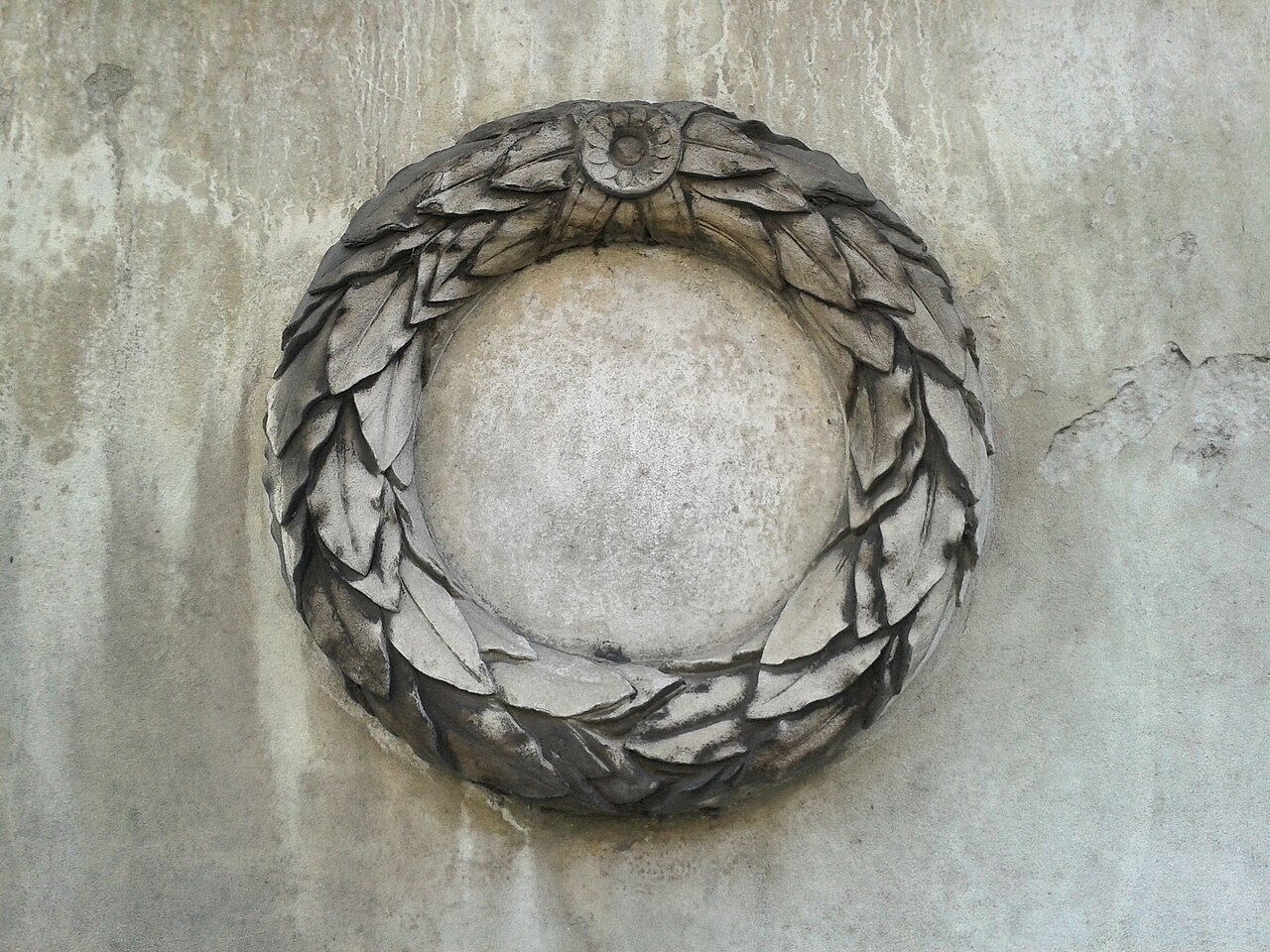Ornamentation and Mouldings
1/88
There's no tags or description
Looks like no tags are added yet.
Name | Mastery | Learn | Test | Matching | Spaced | Call with Kai |
|---|
No analytics yet
Send a link to your students to track their progress
89 Terms
Acanthus Leaves
A stylized leaf motif, one of the primary decorative elements of classical architecture, as evident on the capital of the Corinthian column. With its origins in Greece, it was adopted by Romans and transmitted into the general classical tradition.
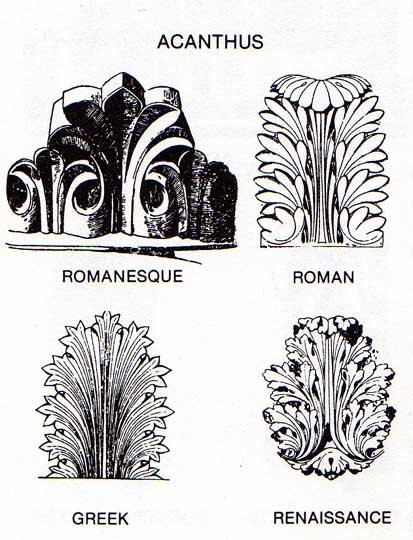
Anthemion
Used in Greece and Roman period, and based on the honeysuckle, palmette , or lotus leaves. Also known as honeysuckle ornament.
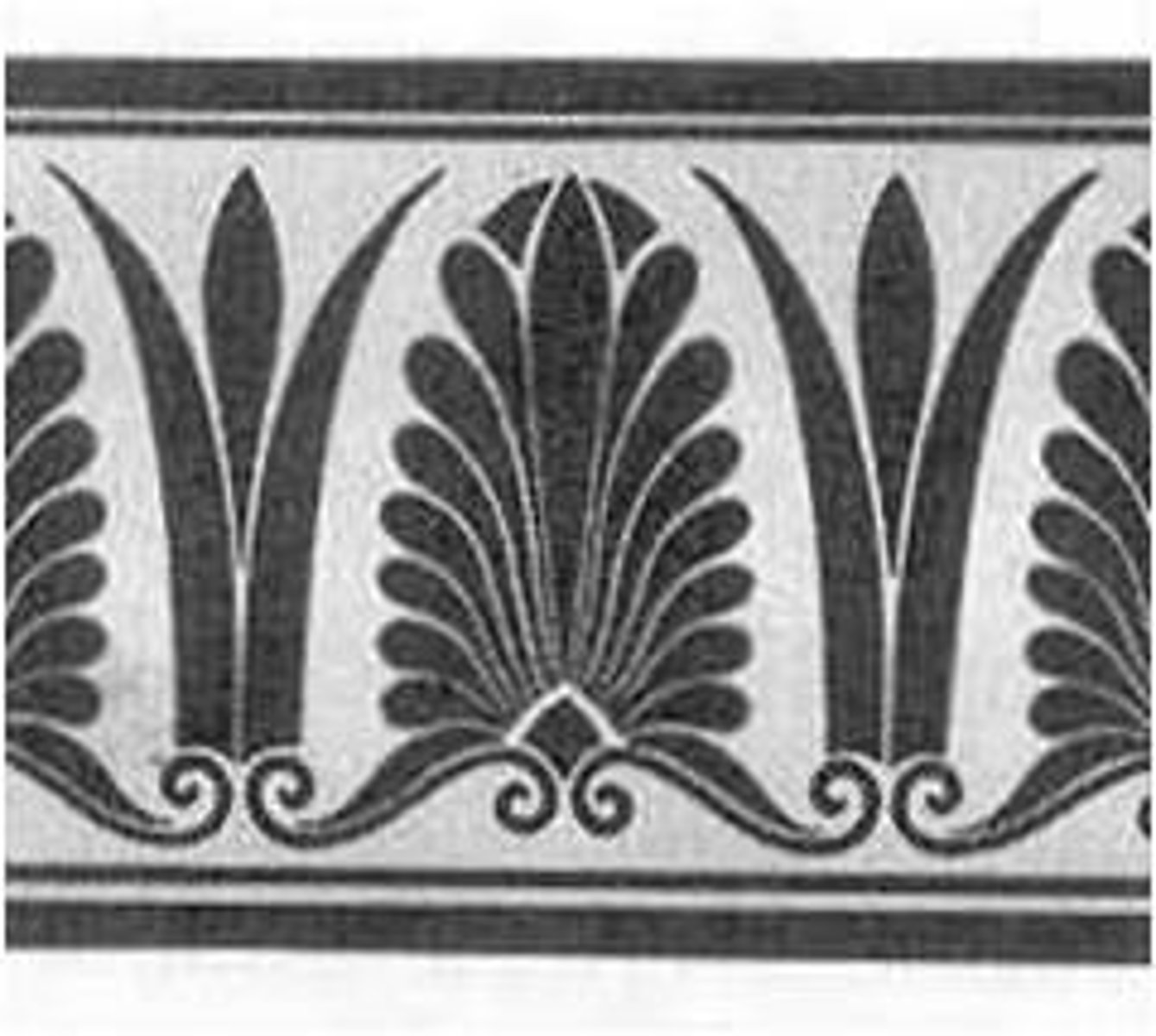
Arabesque
A Moorish design of scrollwork, leaves, flowers, and interlaced branches, beautifully intertwining and flowing pattern of leaves and flowers, and based on the Assyrian Tree of Life. Also known as Rinceau.
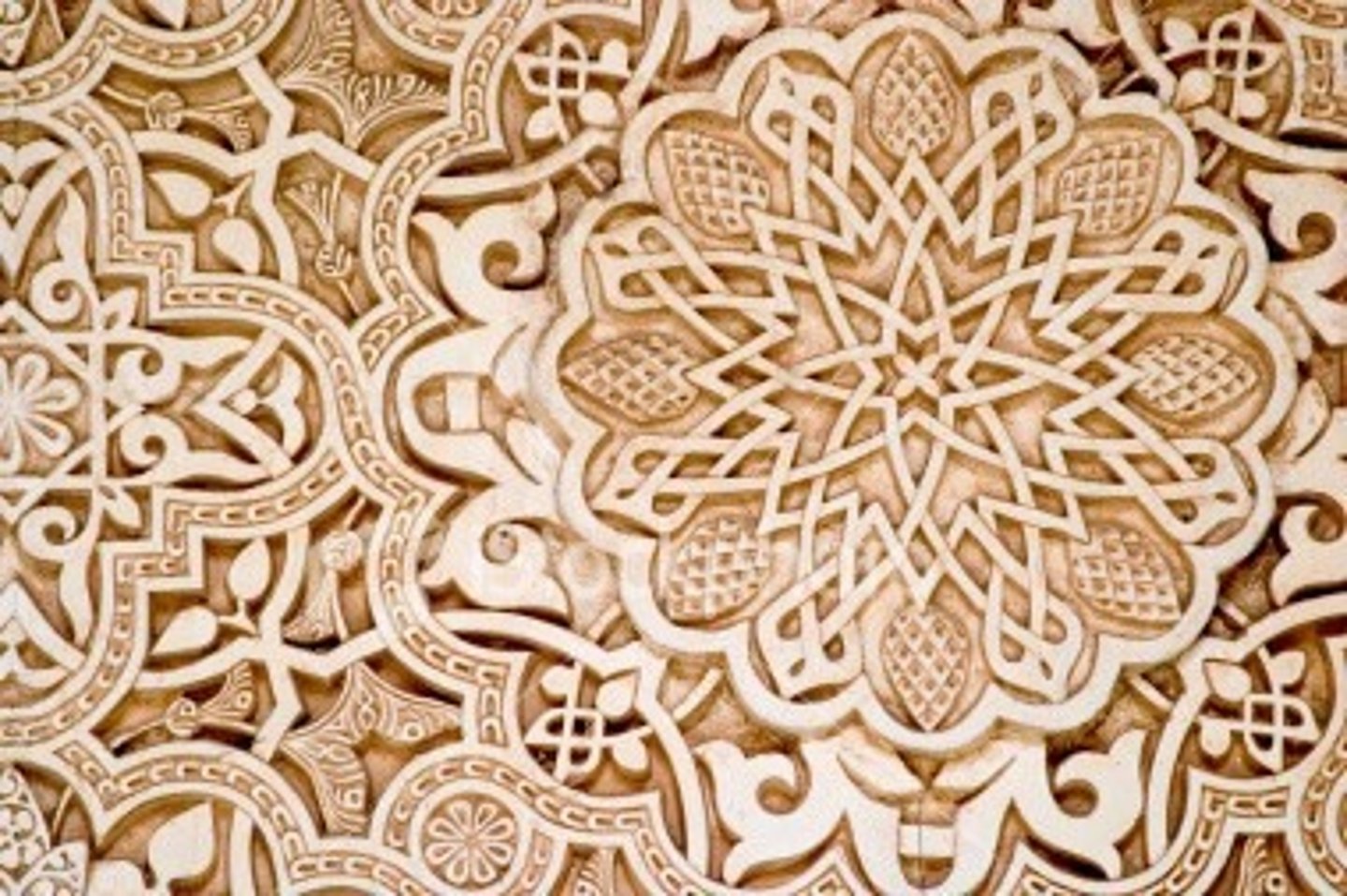
Atlantes
A full or half-male figure used instead of a column or in place of a furniture leg.
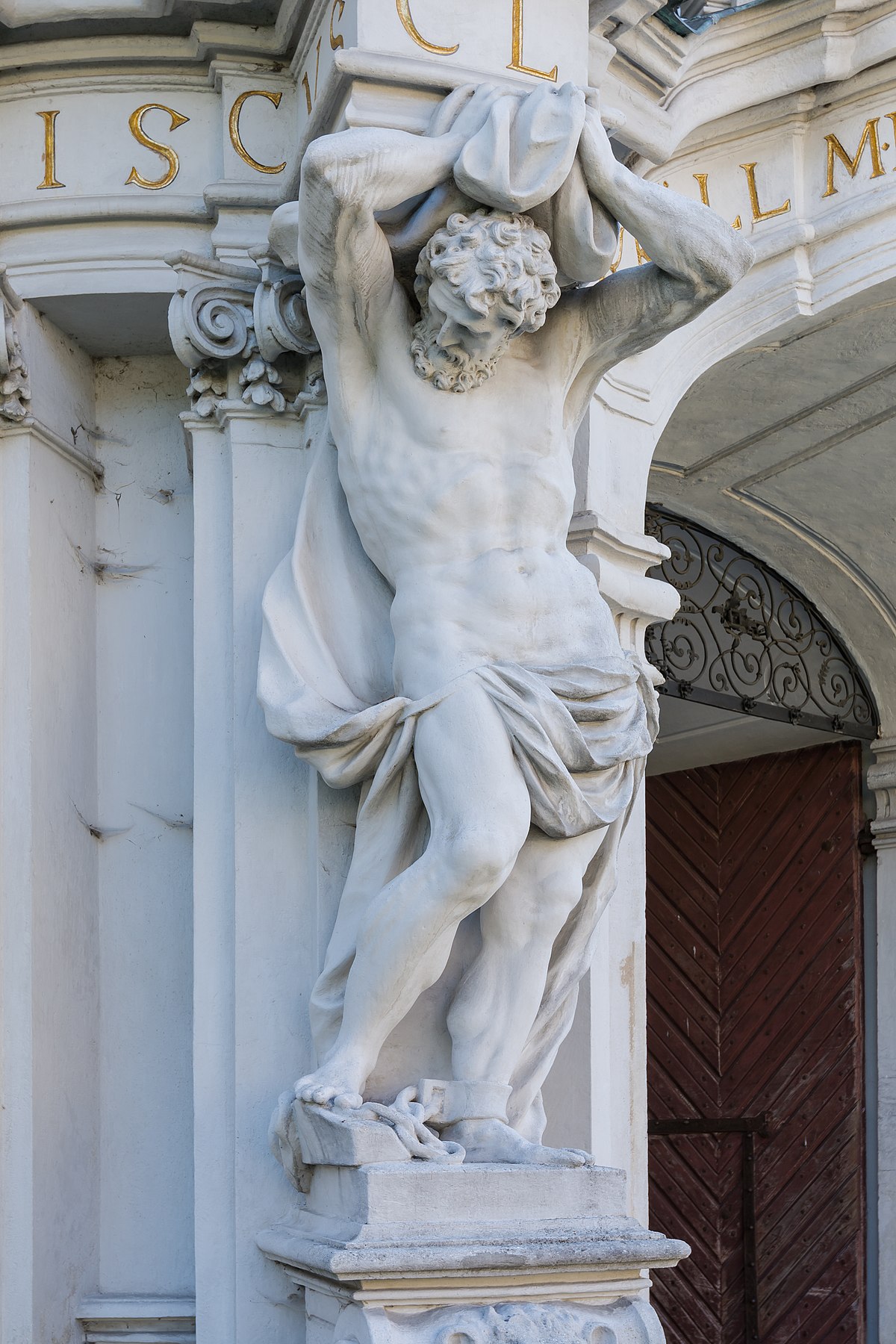
Baseboard
A board placed at the base of a wall and rests on the floor. Usually treated with moldings.
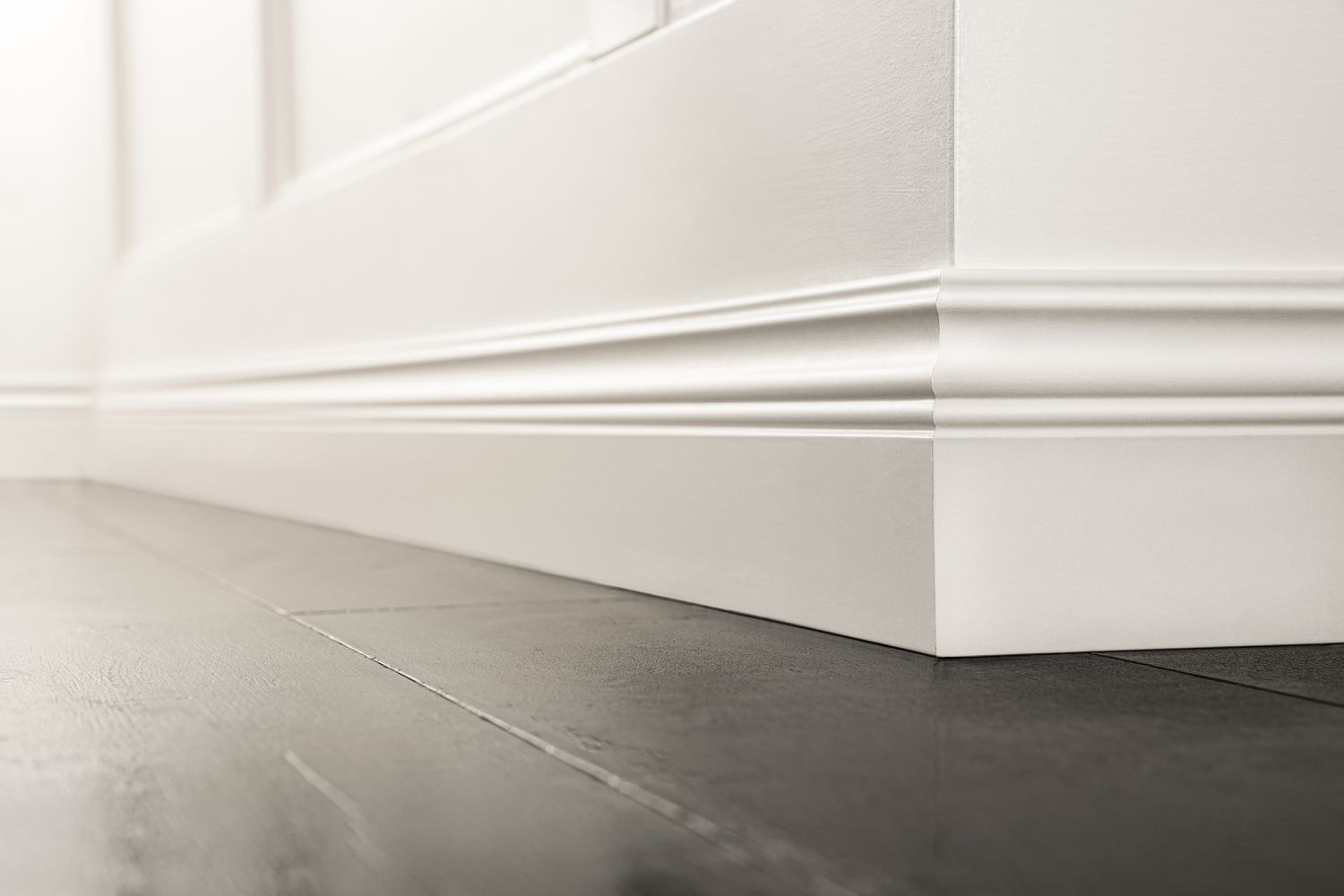
Beading
A decorative strip or moulding that resembles a string of beads. Found on furniture, silver, glassware, pottery, etc.

Bead & Reel
A combination of beads and reels with a ratio of 1:2
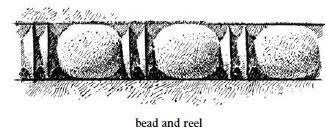
Bevel
The edge of any flat surface that has been cut at a slant to the main area.
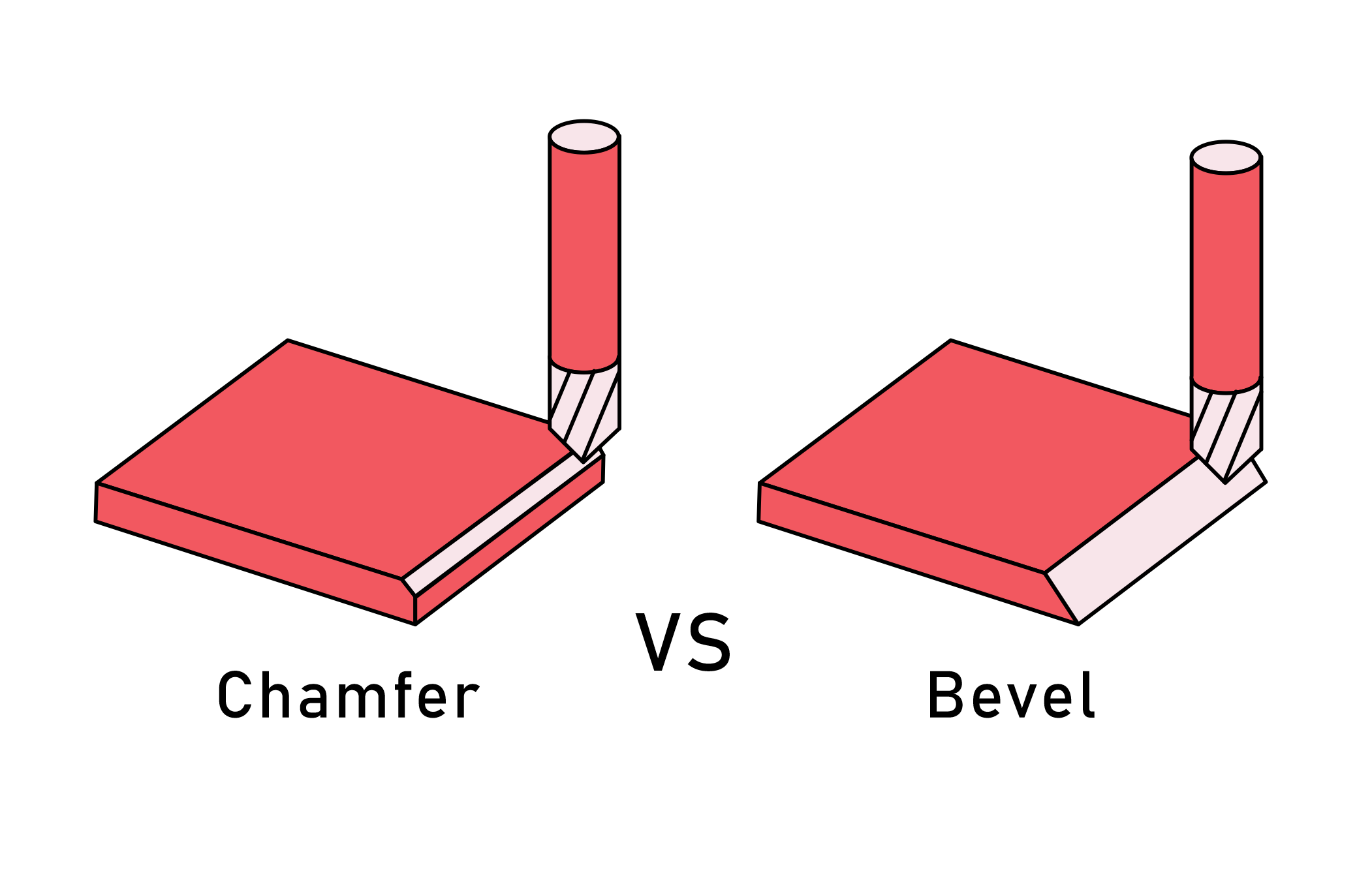
Boulle
Tortoiseshell, ivory, mother-of-pearl and metals of various colors used as inlay to ornament cabinetwork, name is derived from Andre Charles Boulle.
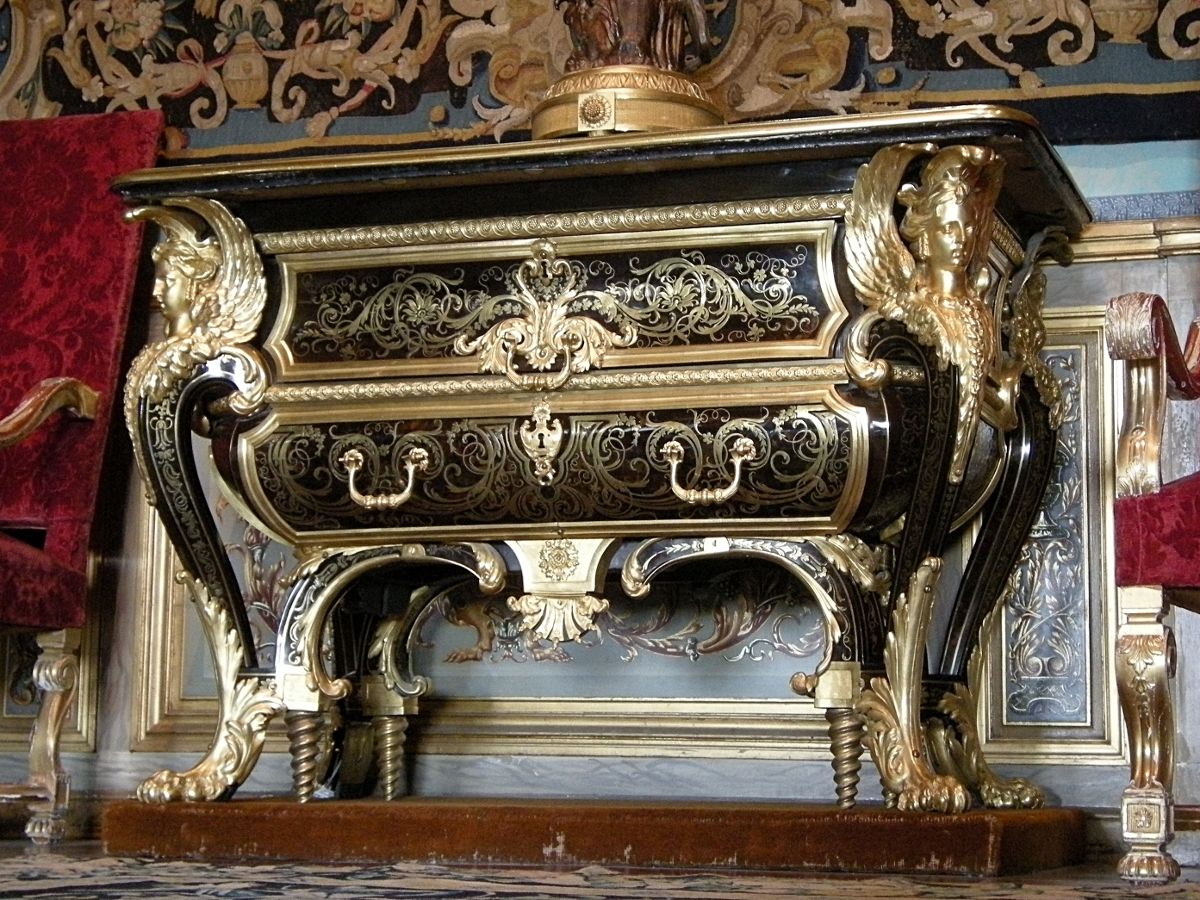
Bullnose
The rounding of an edge
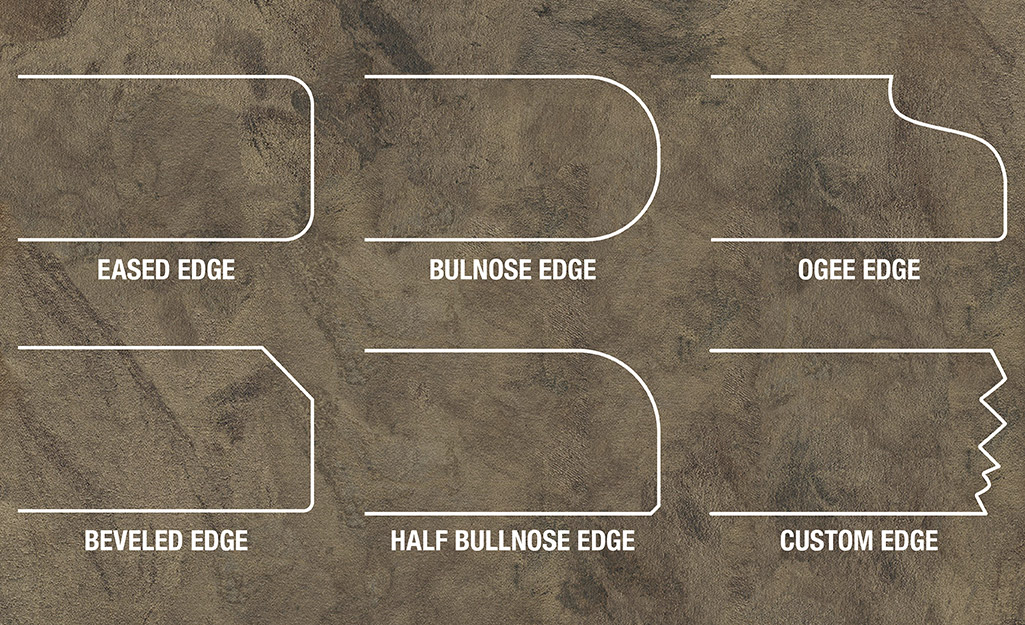
C and S Scroll
Motifs, which simulate the letters c and s which are characteristics of the Rococo style. Found on furniture and decorative frames.
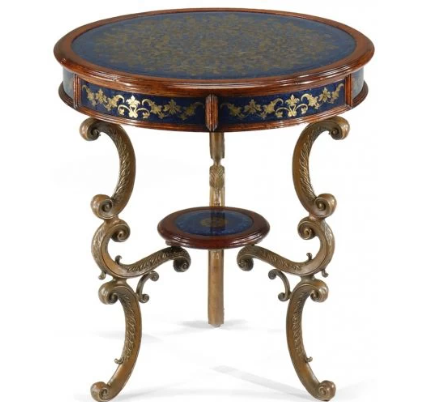
Cartouche
The form of an unrolled scroll with and oval center and having pierced, curled edges. It is a conventionalized shield or ovoid form used as an ornament, often enclosed with wreathes, garlands on scroll-like forms.
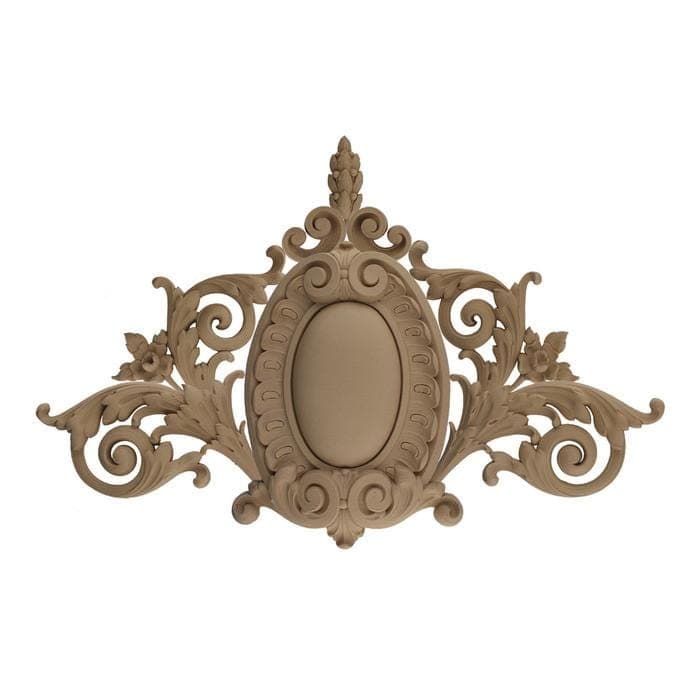
Caryatid
A column carved in human form, used as a supporting motif in an architectural composition. A female figure as column.
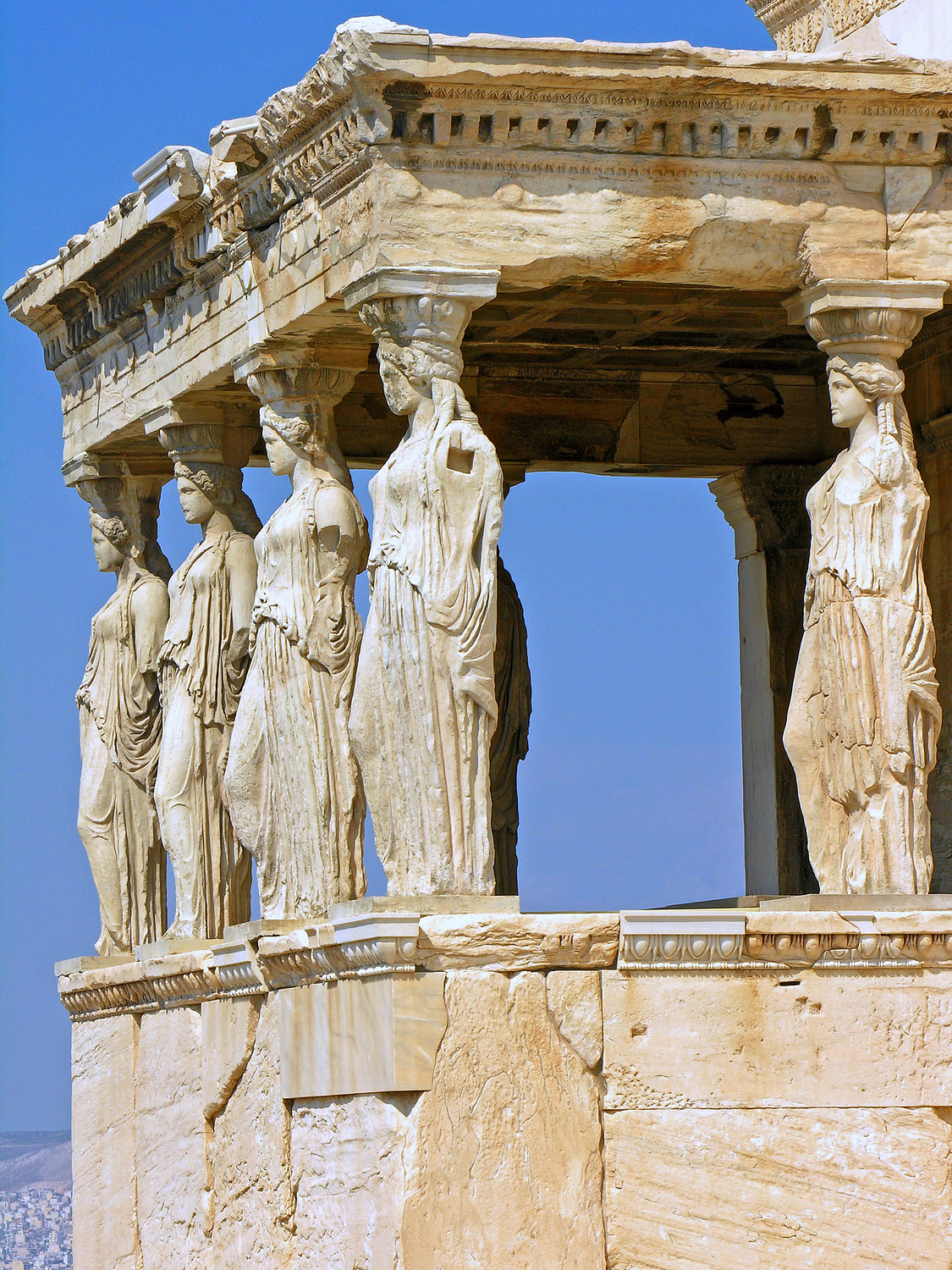
Cavetto
A molding of concave form approximating a quarter circle.
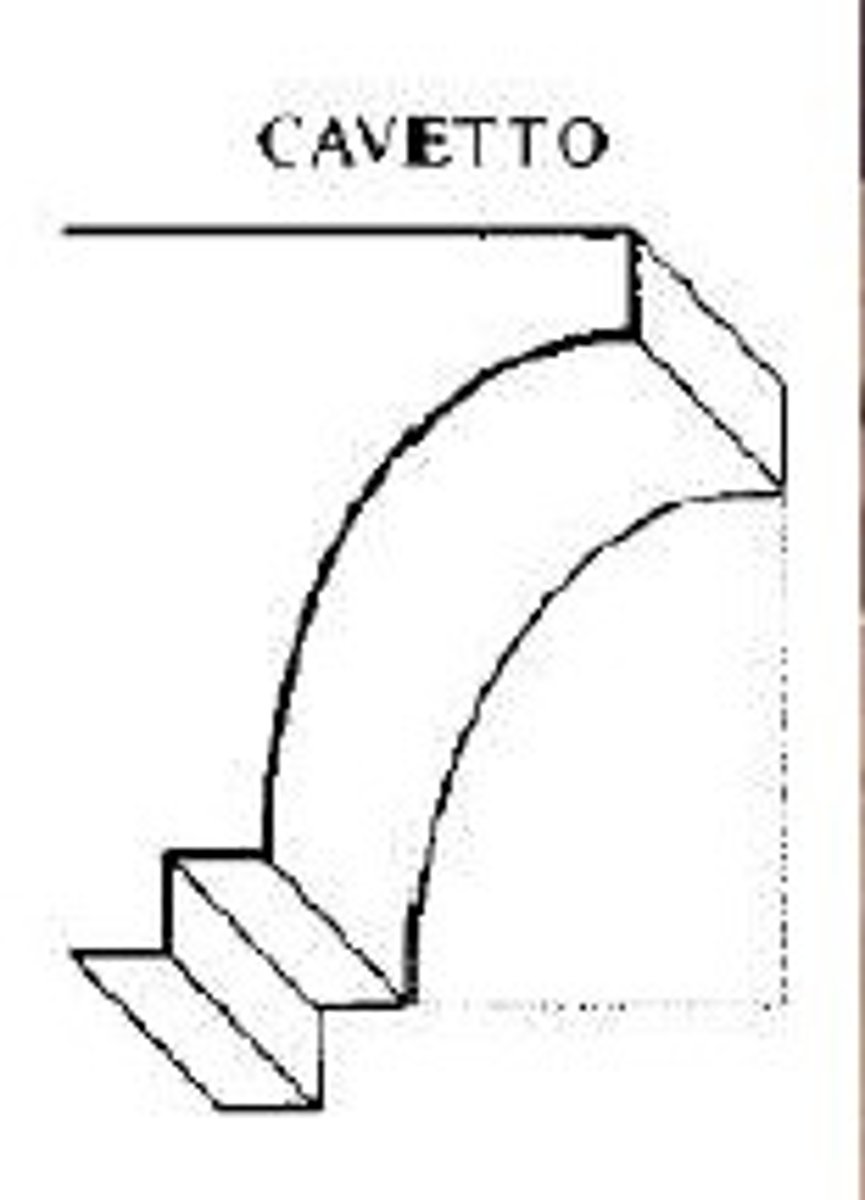
Ceiling Rose
Generally made of plaster,a circular decorative molding fixed to the ceiling, often in the center, ad often has a pendant light fitting suspended from it.
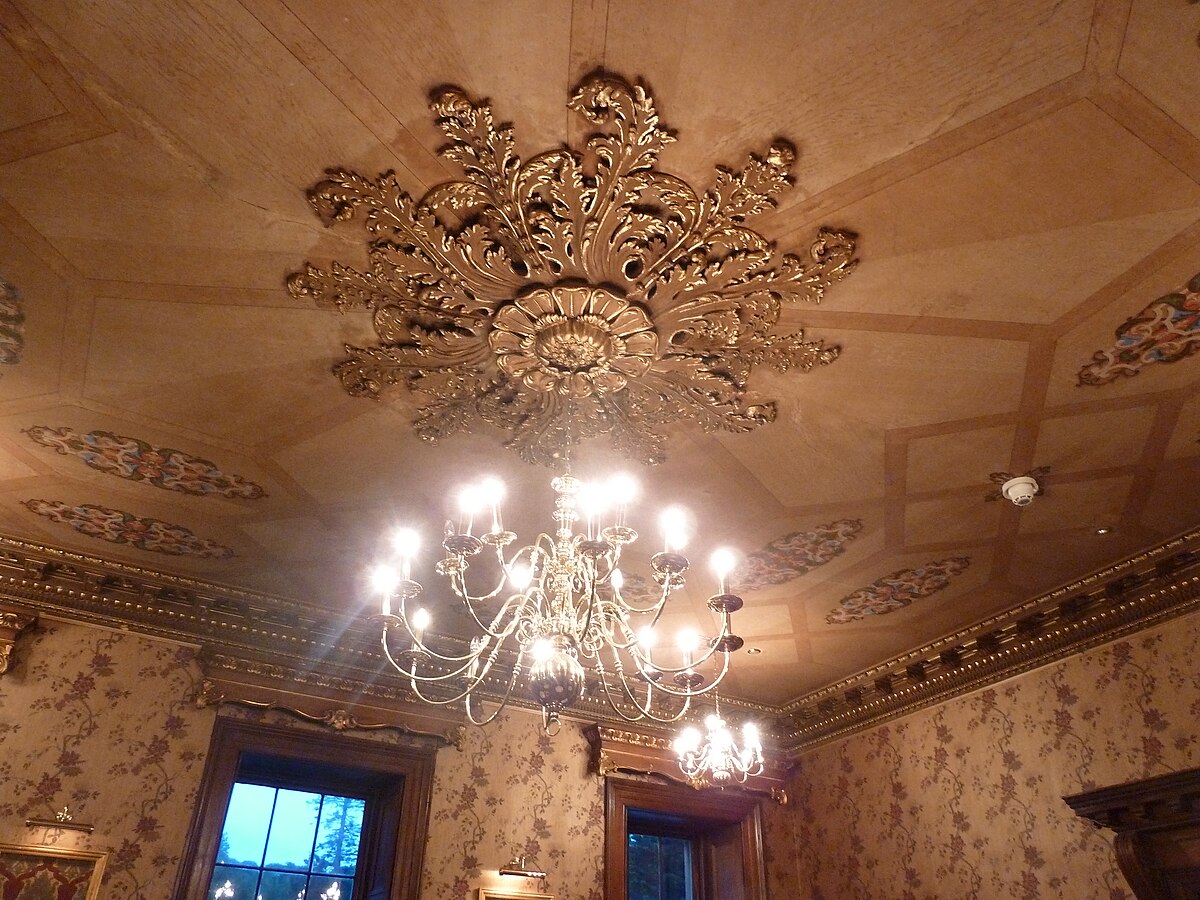
Chair Rail
The topmost molding of a dado, sometimes known as the dado cap. It is placed on a visit at the height of, a chairback to protect the finish of the wall.
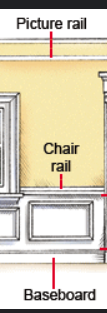
Chamfer
A bevel or slop made by paring off the edges of anything originally right angled. Often used on the legs of furniture.
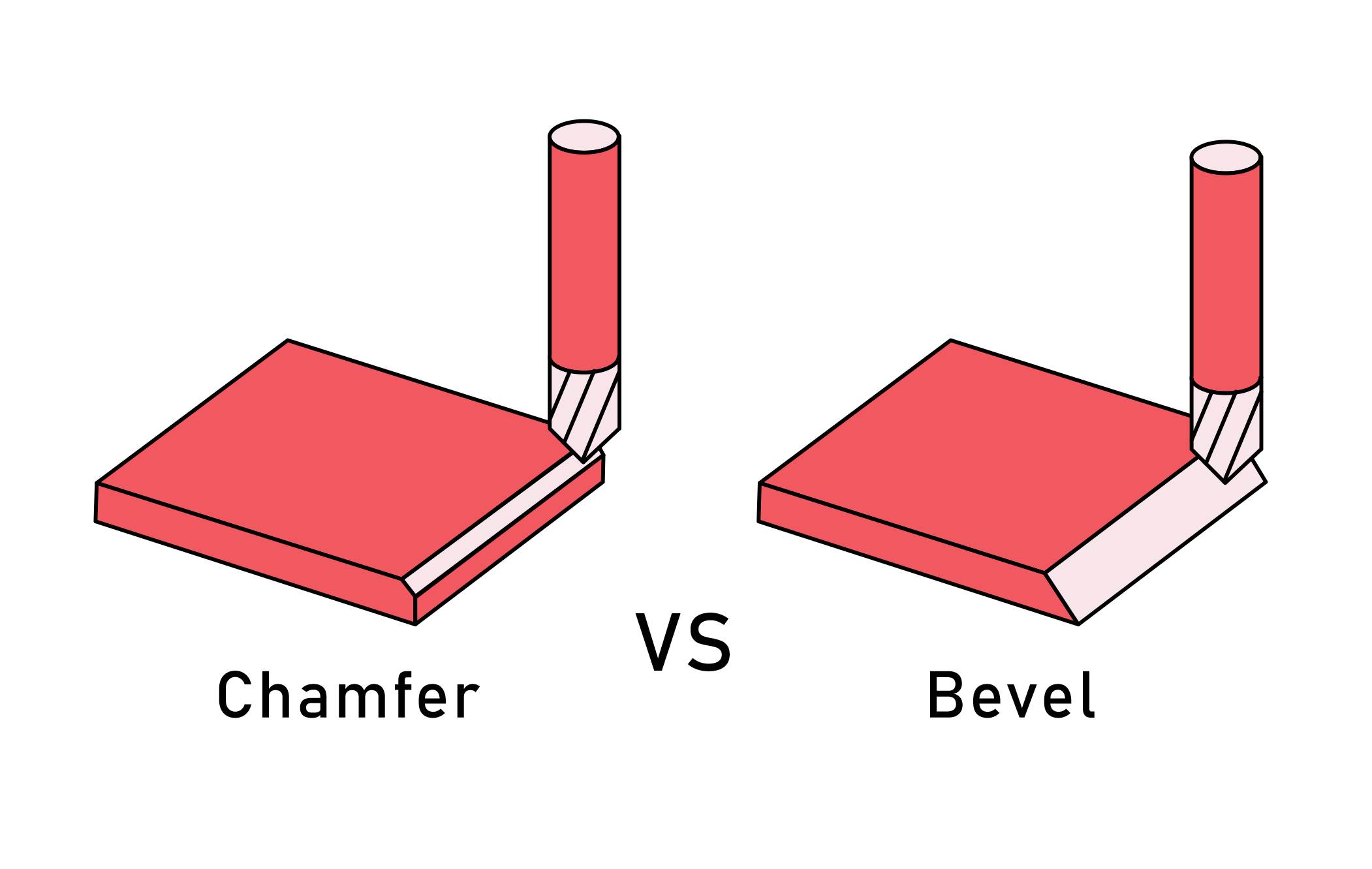
Checkerboard
A pattern consisting of alternating light and dark squares.
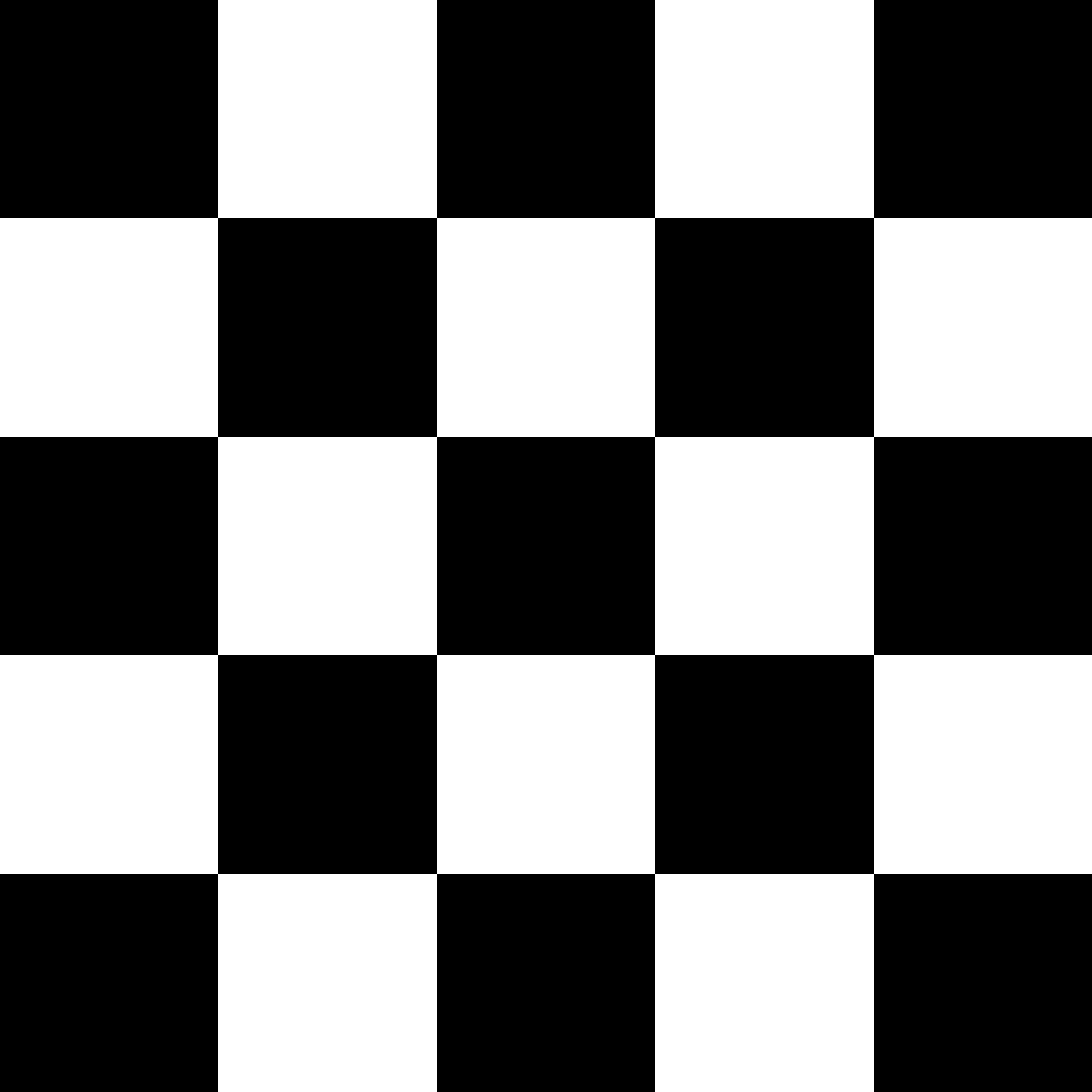
Corner Block
A square block of wood used to form a junction between the sides and head strip of door and window trim. Any block similarly used in cabinet-making.
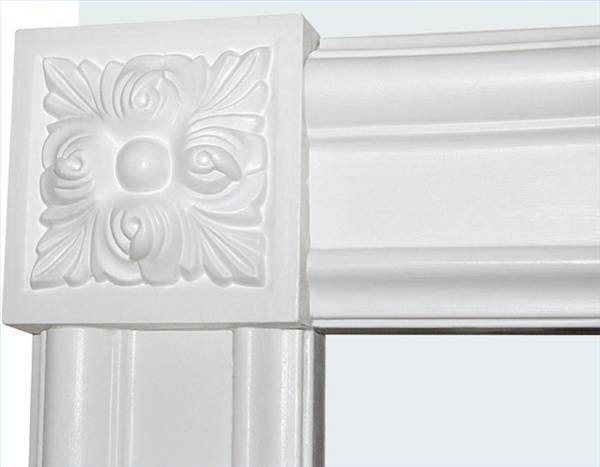
Crocket
Ornament used on the sides of pinnacles, usually leaf or bud shaped shaped; commonly seen in Gothic art.
Also a formalized bunch of leaves carved at intervals on the edge of wood mouldings, prevalent during the Gothic period.
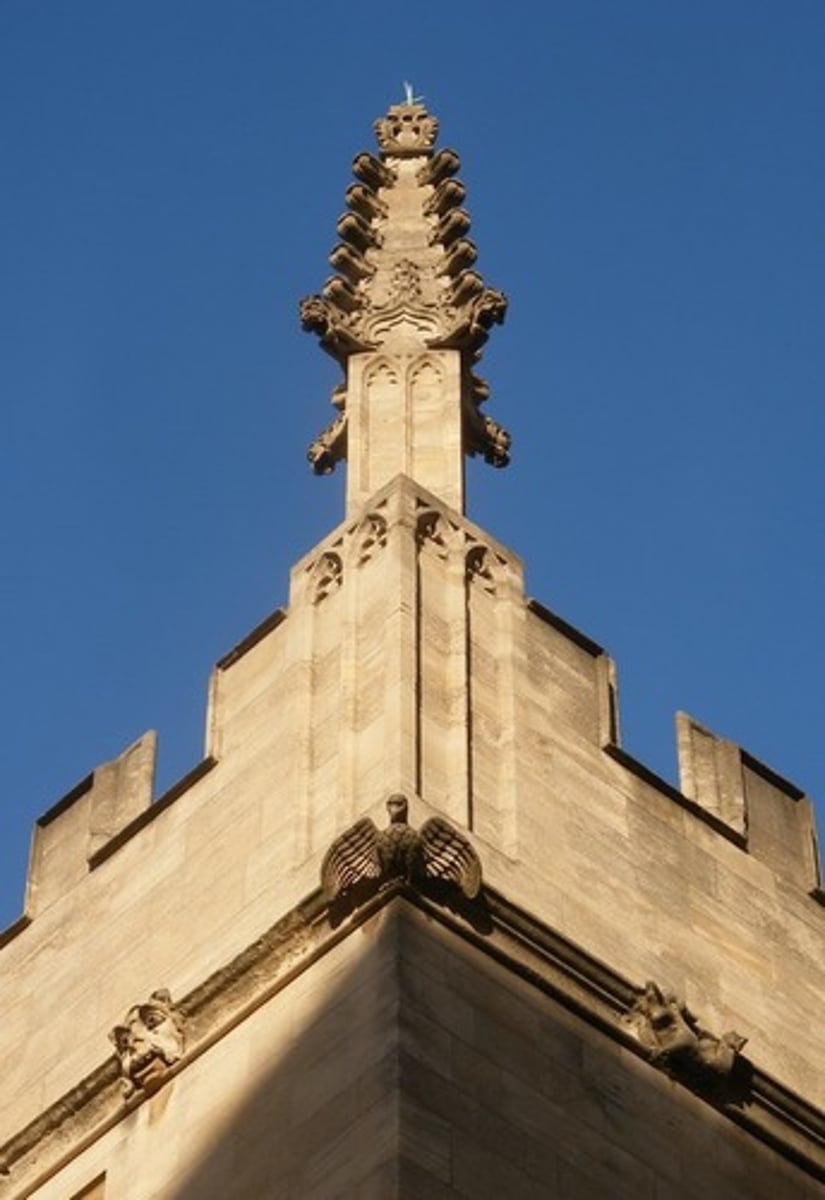
Cinquefoil
A french term meaning "five leaves", a pattern resembling a five-leaved clover.
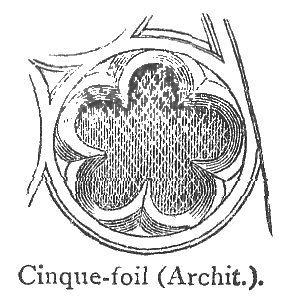
Coffer
An ornamental sunken panel in a ceiling, vault, or the lower surface of an arch, beam or other architectural feature.
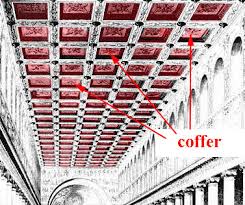
Cornice
A molded projection that crowns a wall, or divides it horizontally for compositional purposes. It my be formed simply with a crown molding or be built up with a number of moldings.
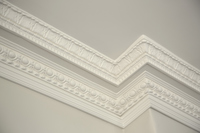
Crown Molding
A decorative moulding at the junction between a wall and ceilings of a room, or the uppermost horizontal moulding of a classical entablature.
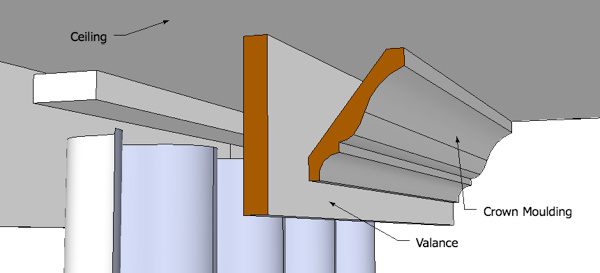
Cyma Recta Curve
An S shapes curve which begins and ends horizontally. “Tummy”
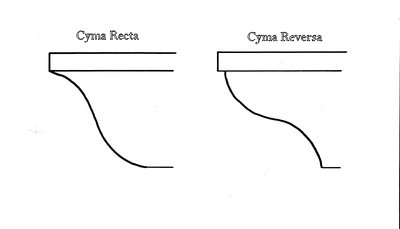
Cyma Reversa Curve
An opposed Cyma Recta, here the curve starts and ends vertically. “Boobs”
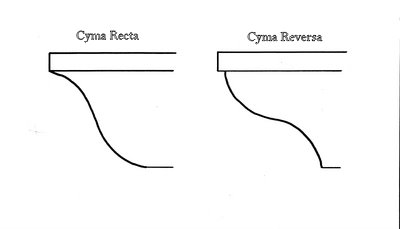
Dado
The lower portion of a wall, when treated differently from the surface above it. In the classical styles, this is usually has a base, shaft, and crap molding, and is often paneled or ornamented.
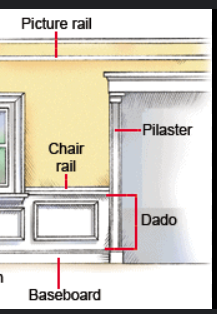
Diaper Pattern
An all-over or repeating pattern without definite limits.
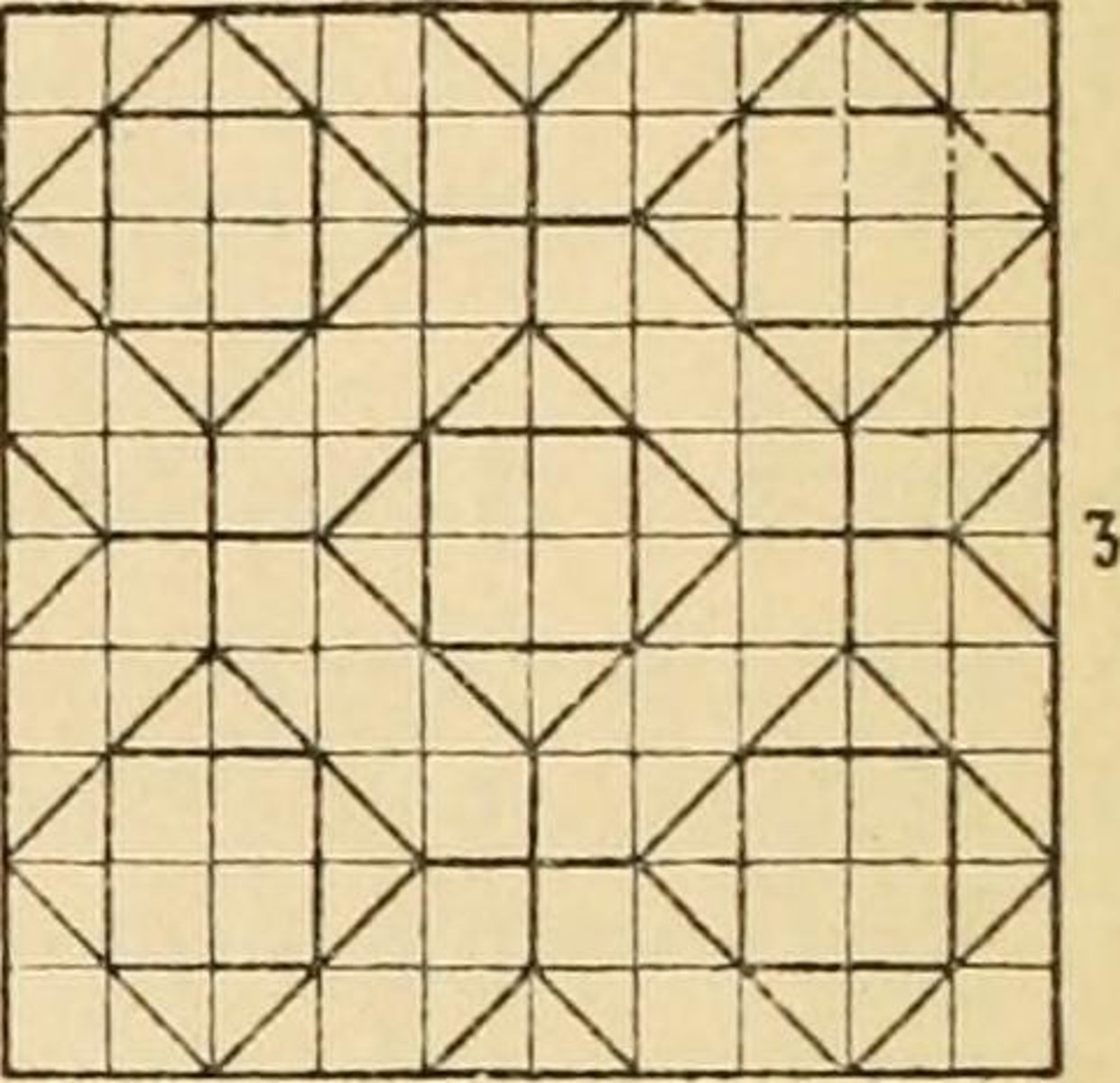
Dentil
A small square projecting block in a cornice.
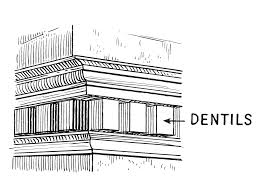
Echinus
An ovoid shaped molding forming part of a classical capital. It springs from the shaft of the column, just under the abacus.
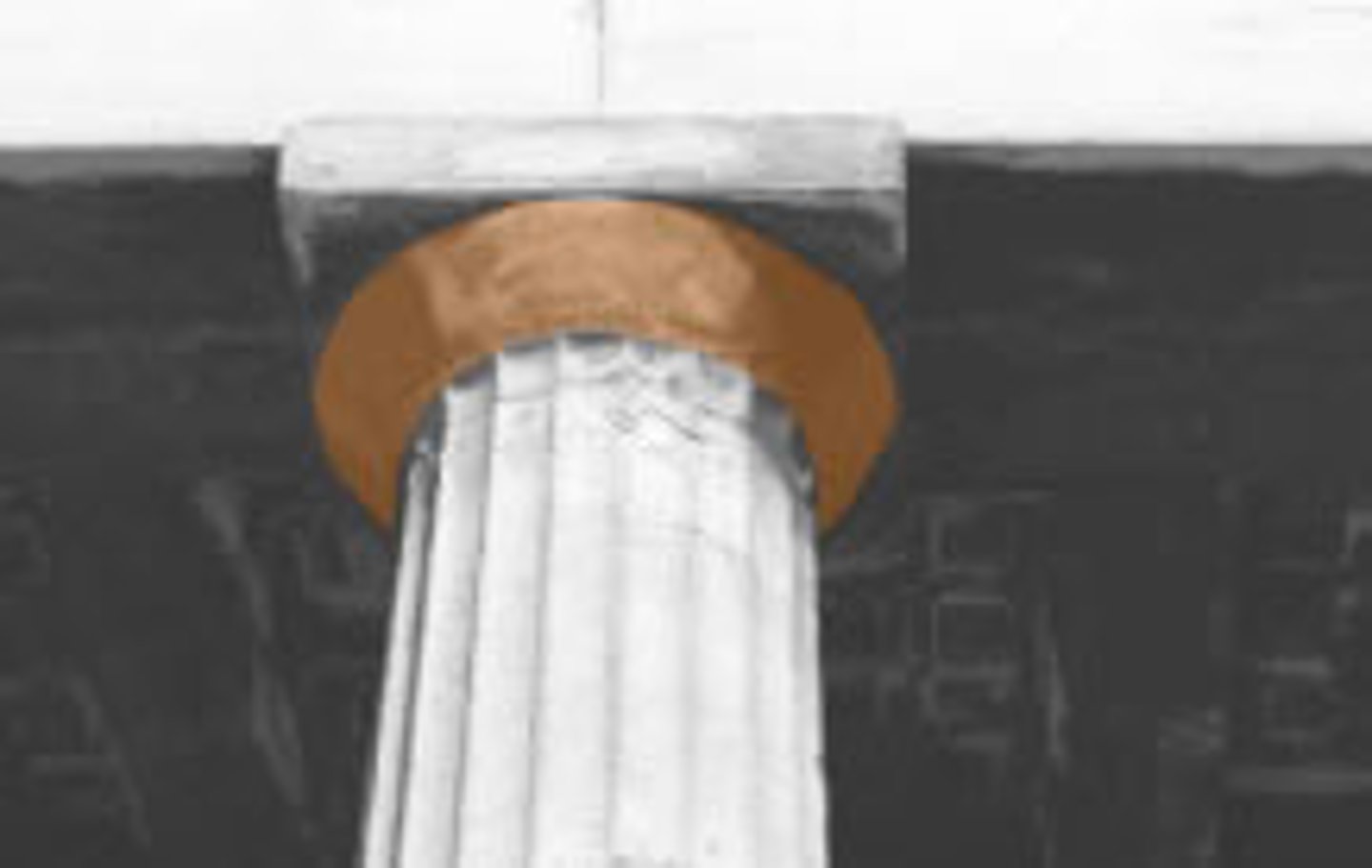
Egg and Dart Moulding
A classical motif found on architectural elements such as decorative cornices and also furniture. Consists of repeated and alternate dart and egg (oval) shapes.
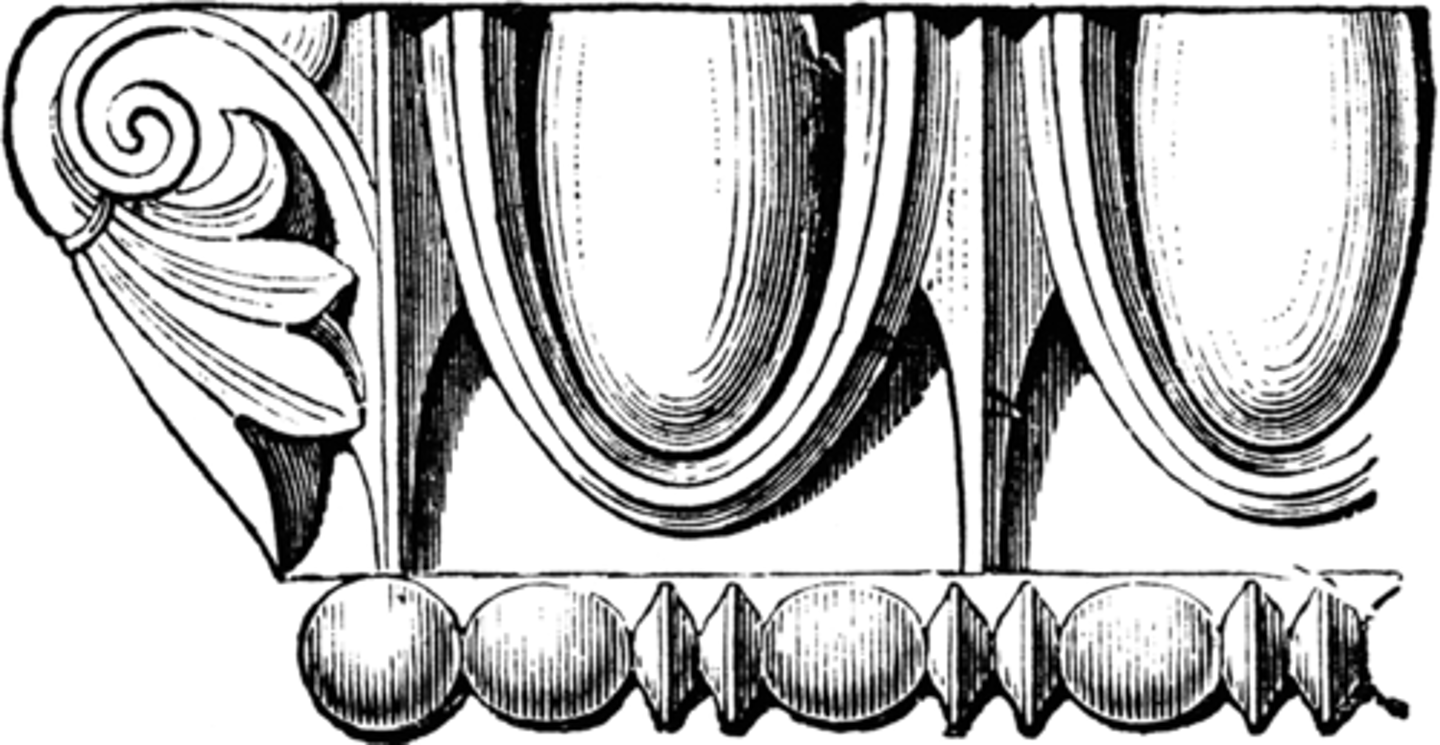
Espagnolette
A female head and bust used at the top of a vollute.
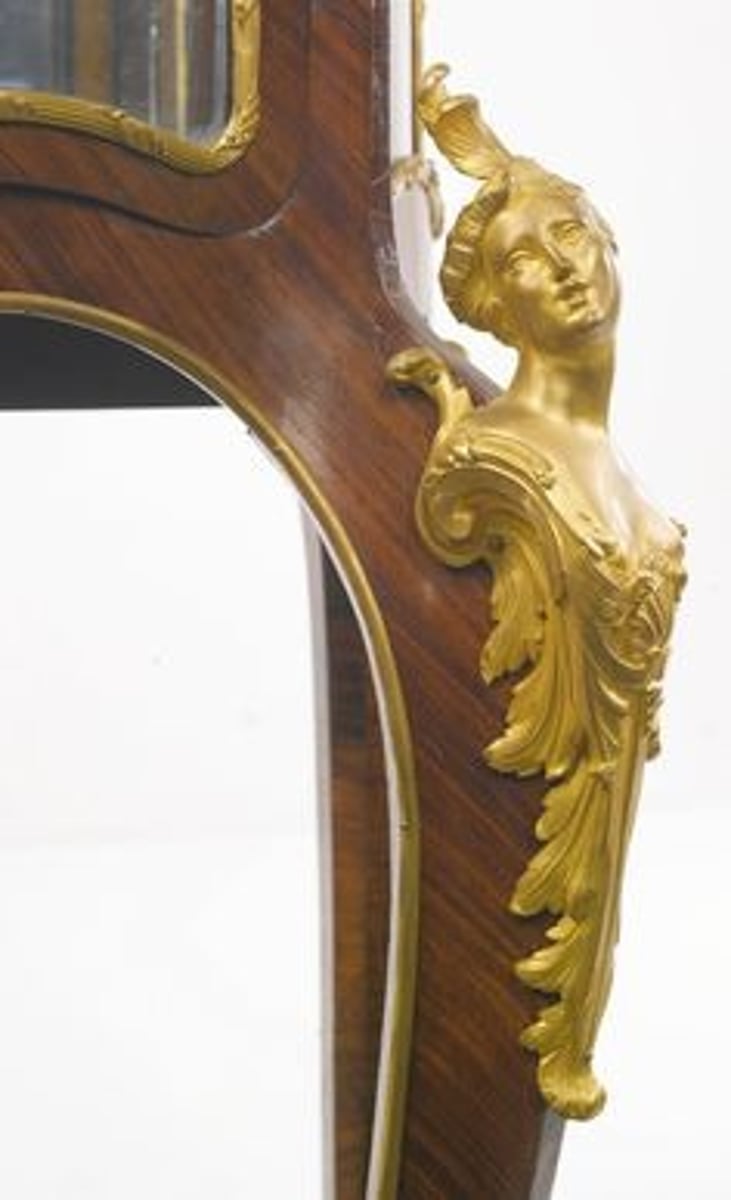
Festoon
A string of many kinds of material hanging in a curve between two points.
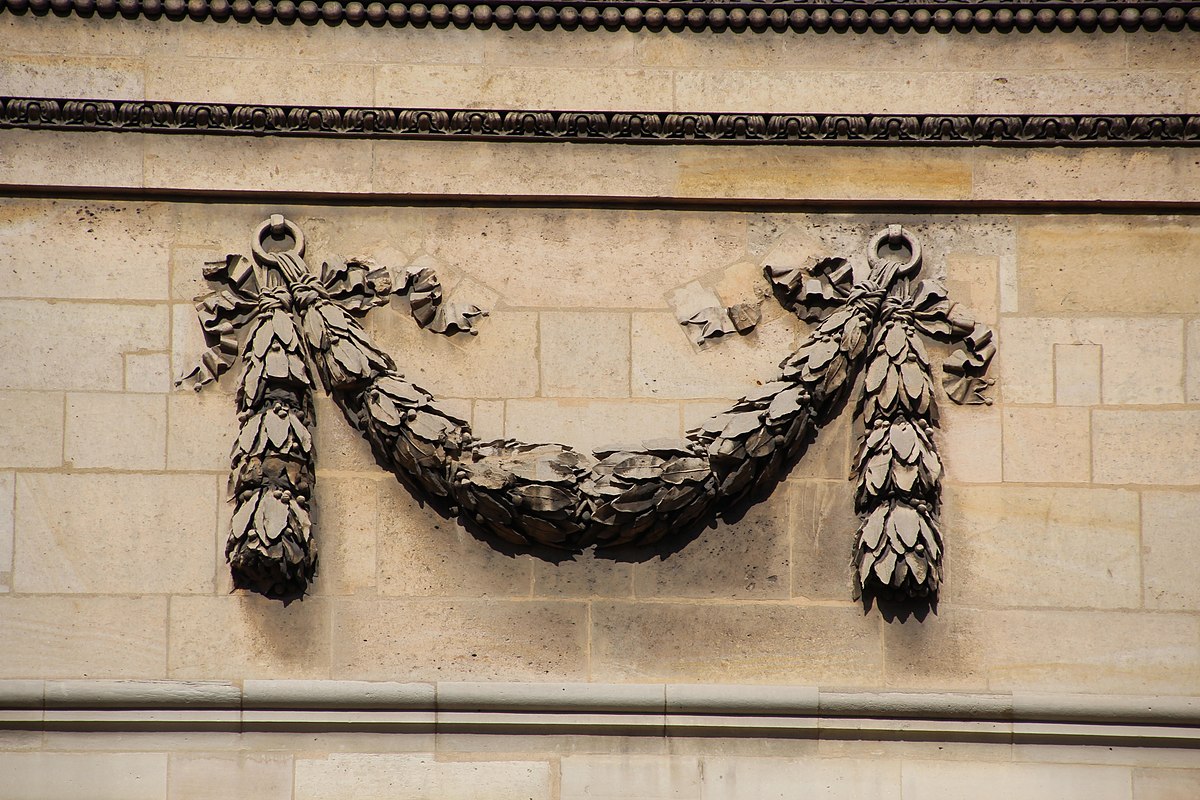
Filigree
A divider with an openwork design, the lady effect produced by twisting and curling wire together or the open work in porcelain.
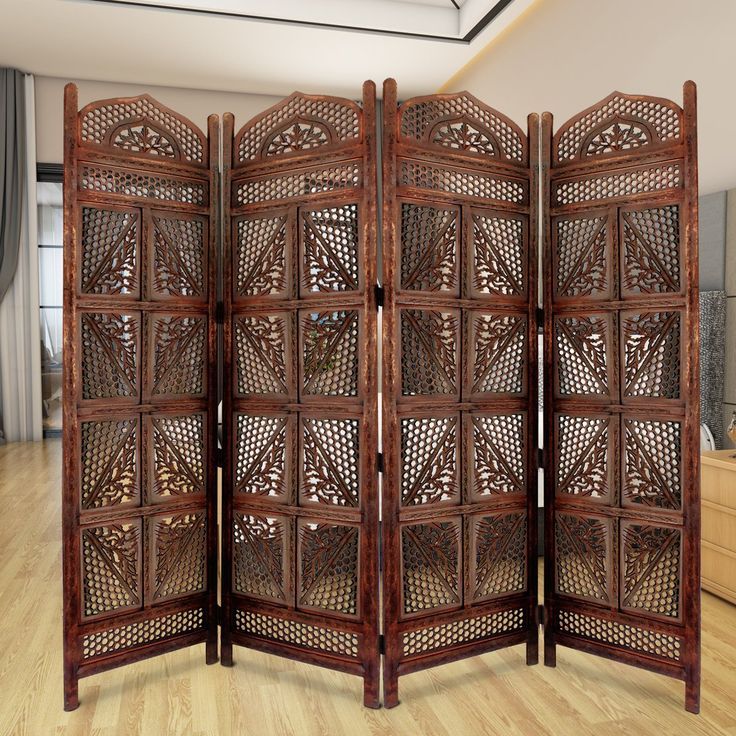
Fillet
A narrow flat moulding raised or sunk to separate larger moldings or areas.
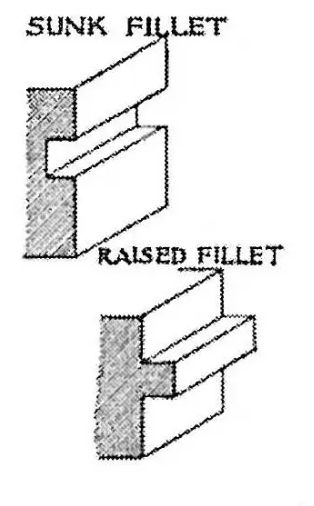
Fleur-De-Lis
A stylized three-pleated iris flower tied by an encircling band, used as the heraidic bearing of the royal family of France.
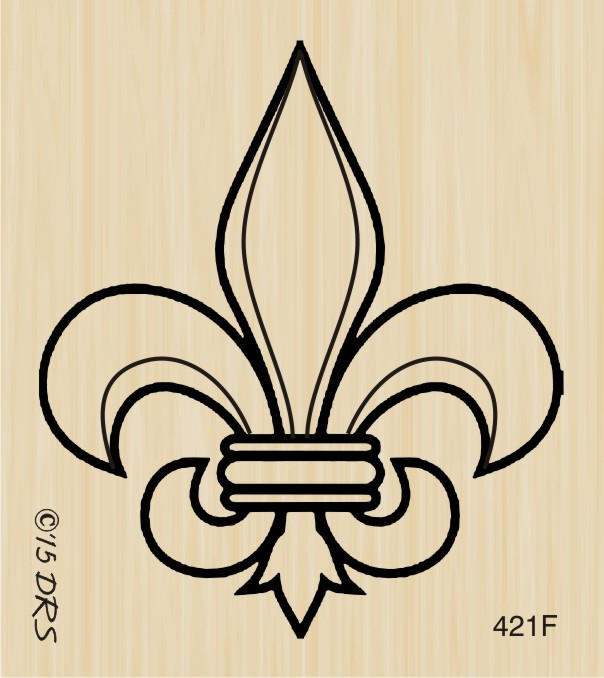
Flutes
Channels in a vertical position used to embellish columns, pilasters, or furniture legs. These are parallel concave grooves that are used to ornament a surface.
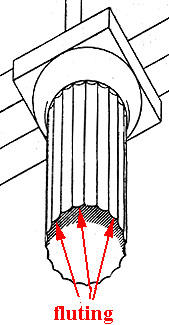
Fret
A Greek geometric band or border motif, consisting of interfacing or interlocking lines, also known as the meander or key pattern.
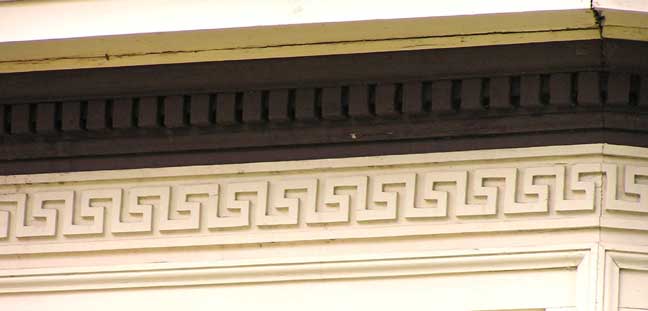
Gadroon
Elongated ovoid form placed in a parallel series and projecting beyond the surface they enrich.
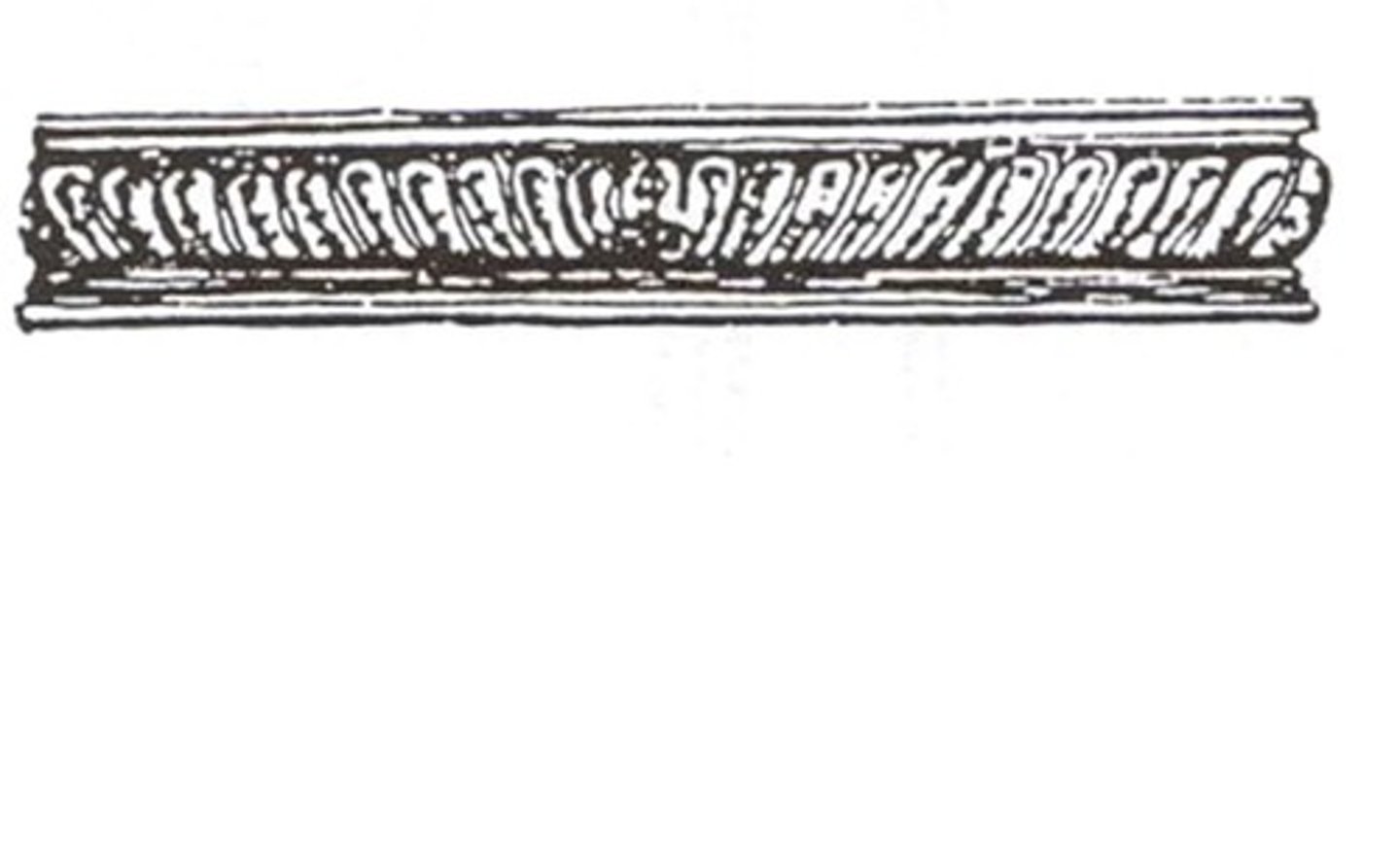
Gaine
A pilaster that narrows towards the bottom and is capped with topless female half-figures.
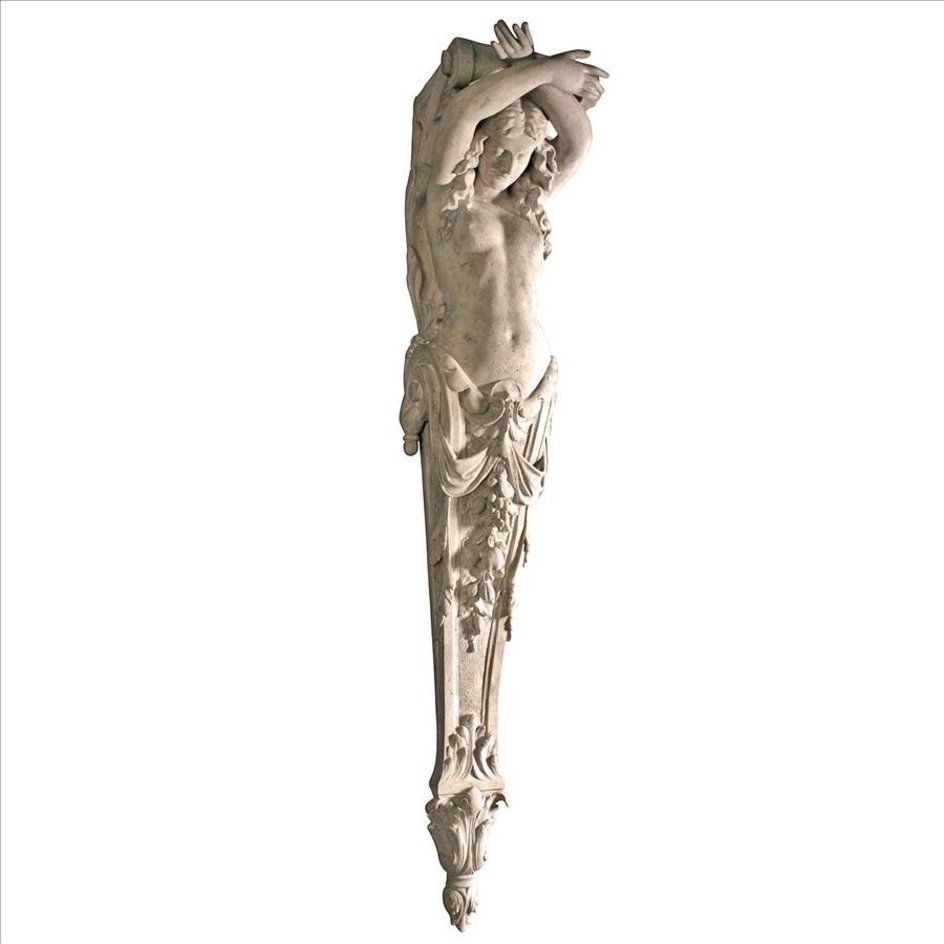
Gargoyle
A grotesque animal or human form used as a water spout.
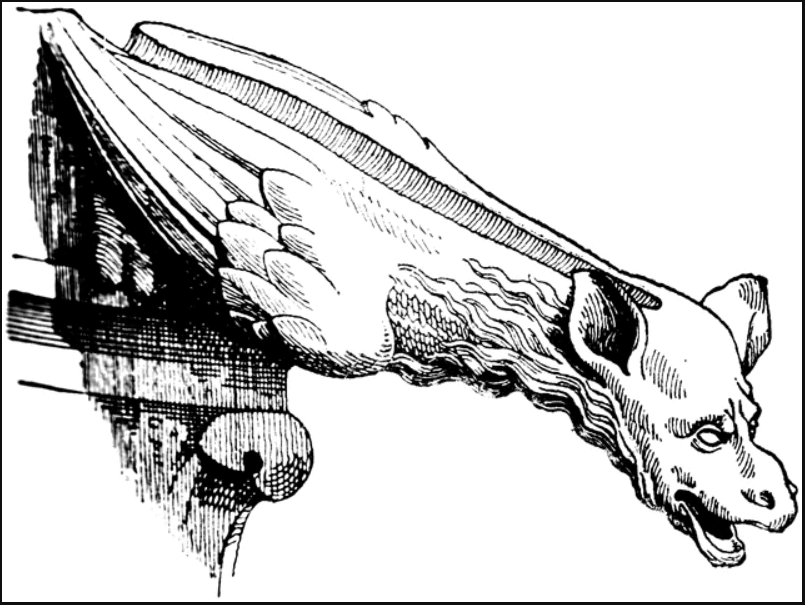
Gesso
A prepared plaster of chalk and white lead which may be cast to make repeating ornamental forms in relief to apply to wood panels, plaster surfaces etc.
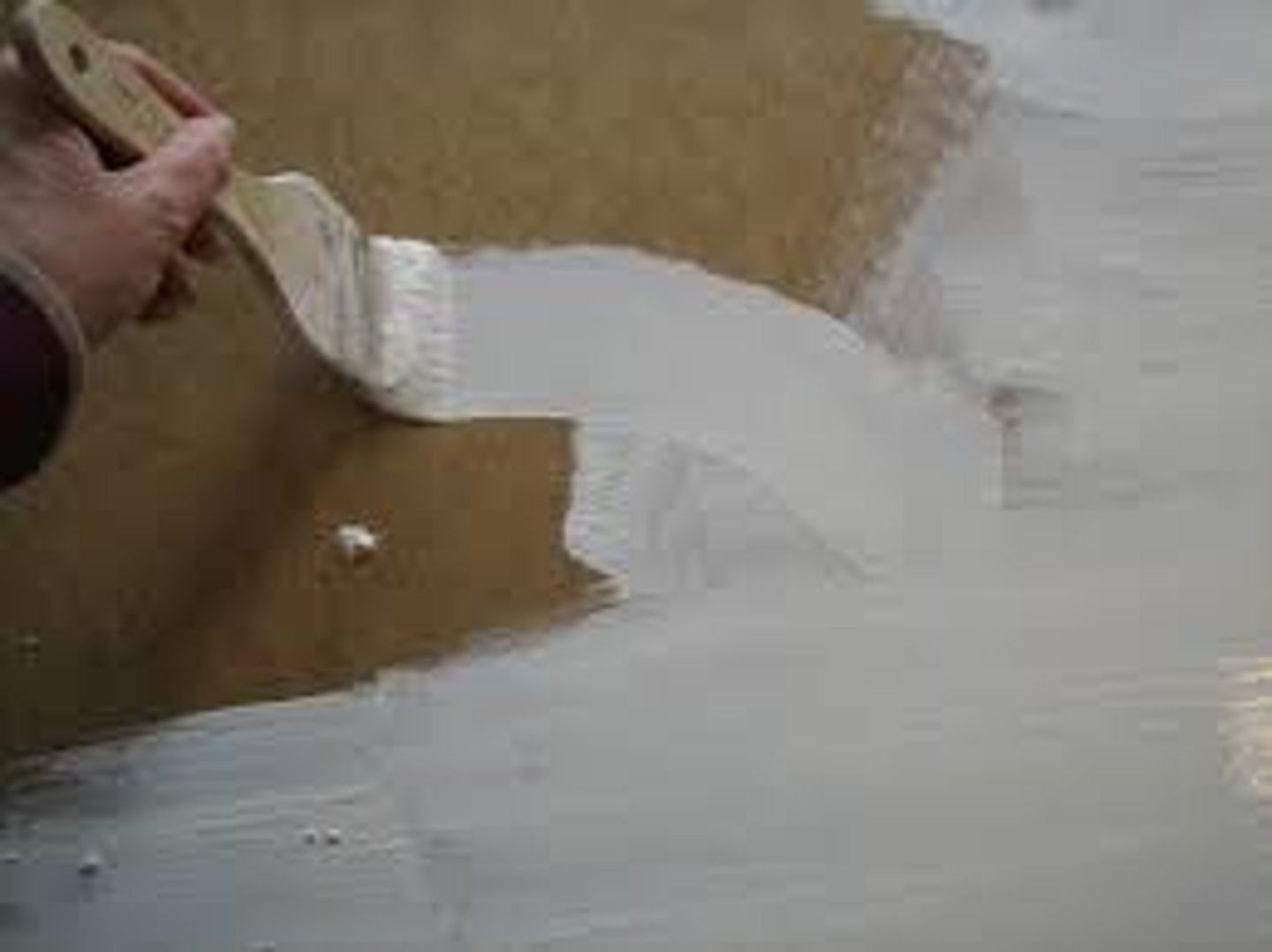
Griffin
A monster with the body of a lion and the head of and wings of an eagle.
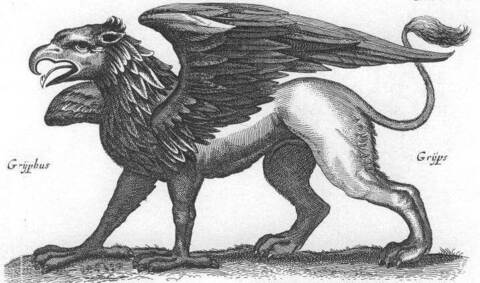
Grotesque
An incongruous combination of monstrous animal and human forms.
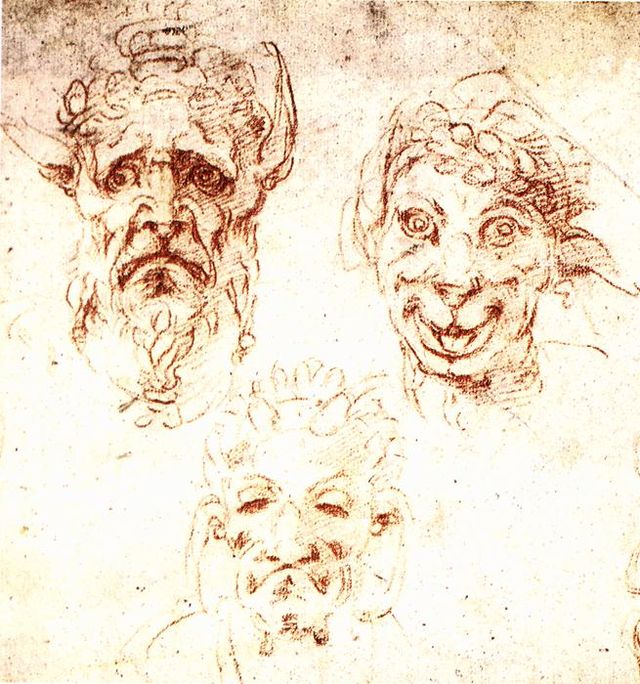
Guilloche
A band or border running pattern having the appearance of overlapping or interlacing circular forms.
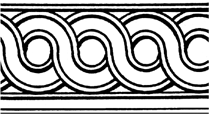
Herm
A tapering pilaster terminating in a head or bust of a male. It is used in Ancient Greece as a boundary marker or signpost.
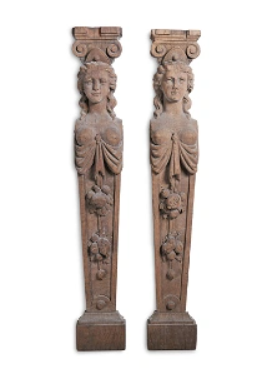
Hock
A cabriole leg formed like the tarsal joint of the hind leg of a quadruped.
Honeysuckle
A decorative motif of Greek origin resembling a conventionalized fanlike arrangement of petals.
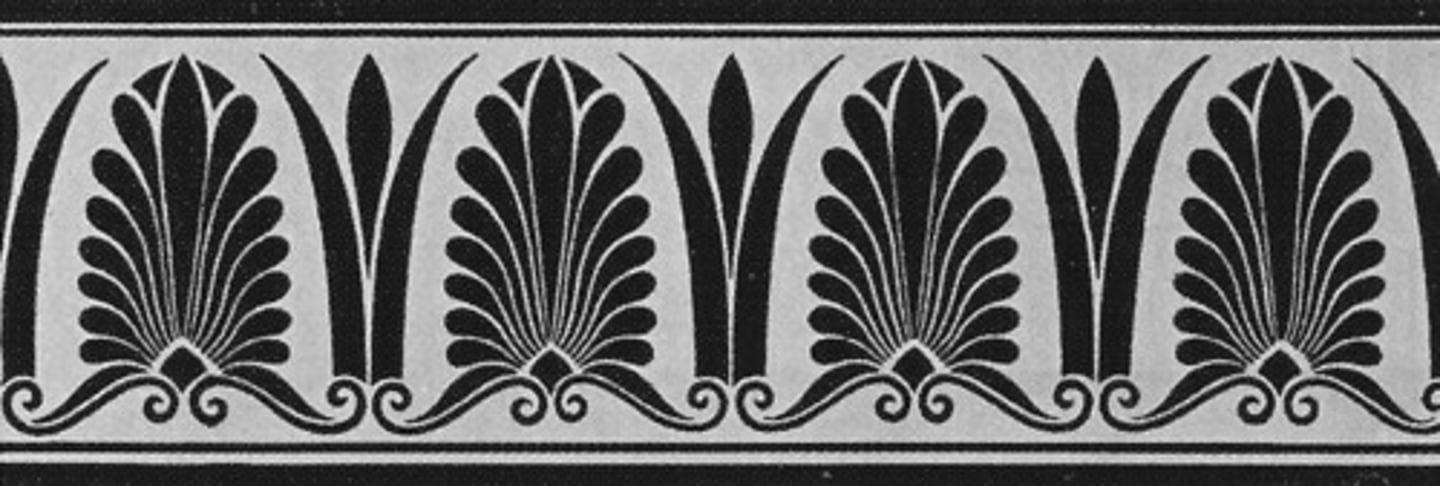
Linenfold
A panel resembling folded cloth. It was prevalent during the Gothic Era.
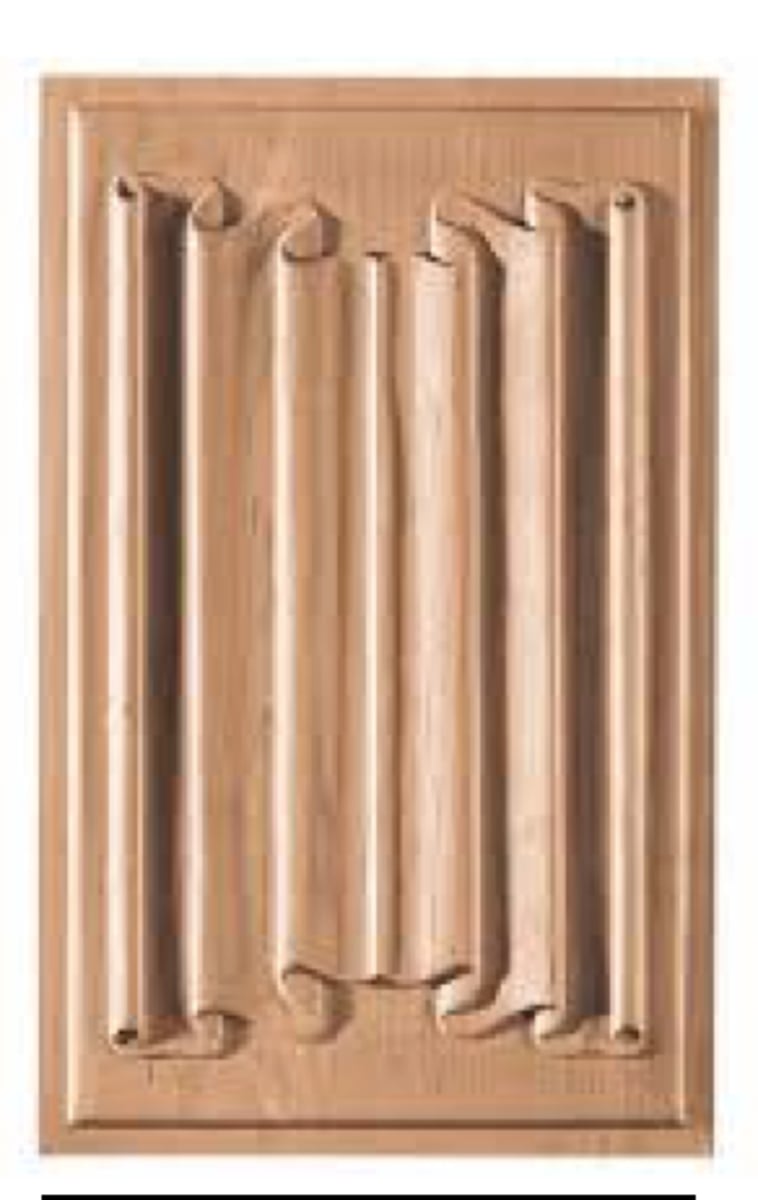
Lozenge
An alternate name for the conventional diamond-shape motif.
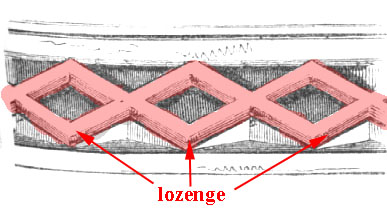
Lunette
A form resembling a crescent or half moon.
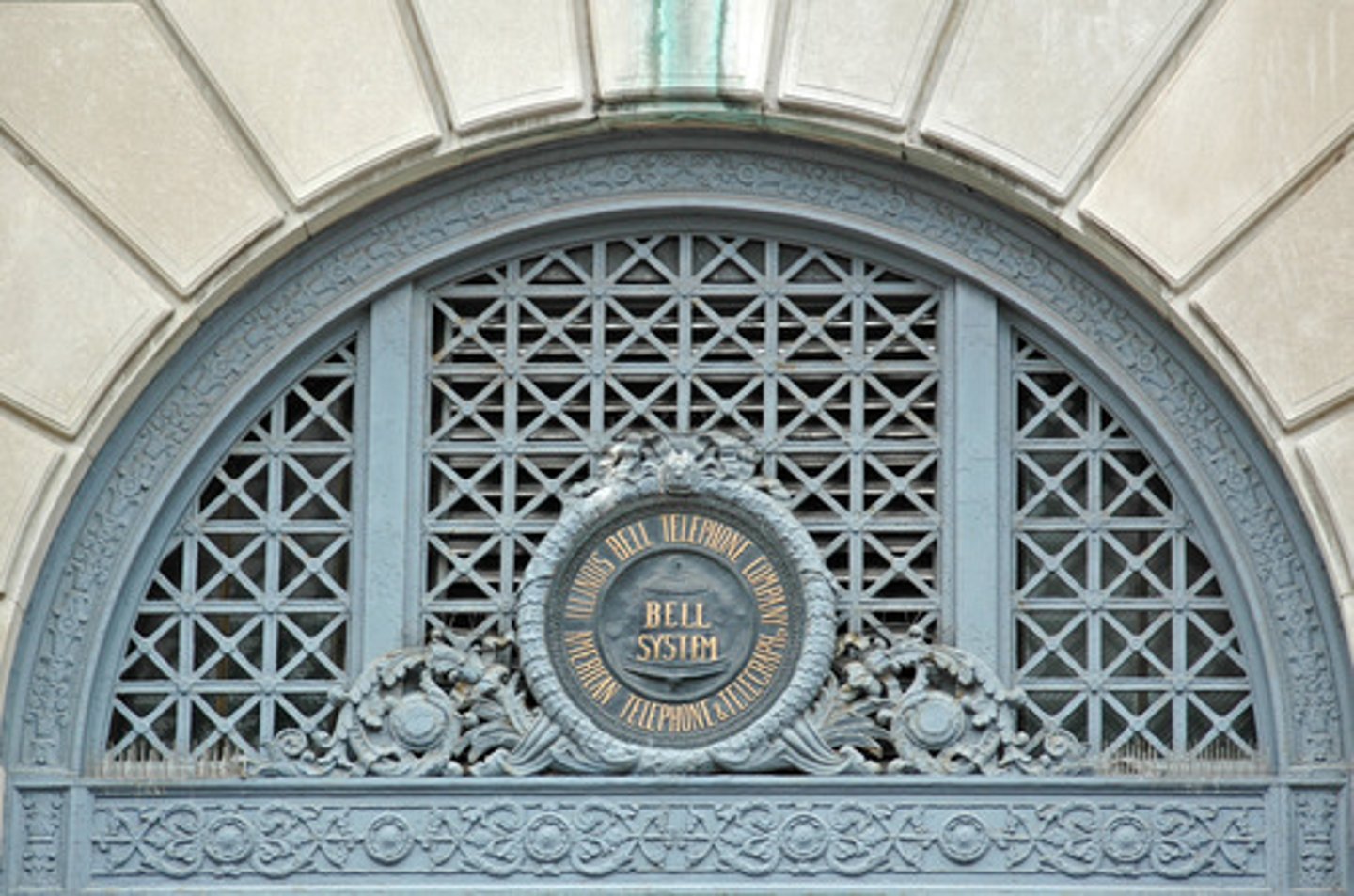
Mascaron
A grotesque head or mask.
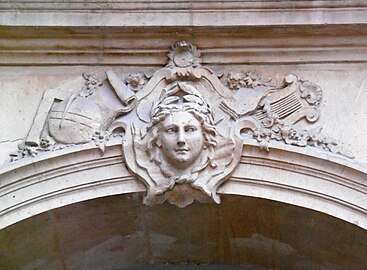
Meander
A running ornament consisting of an intricate variety of fret or fretwork.
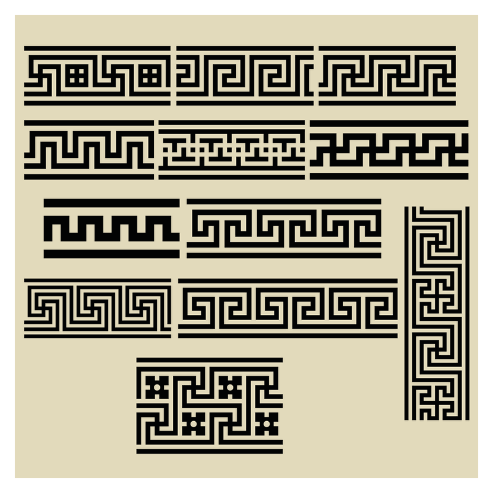
Melon Bulb
A highly ornamented turning in two sections.
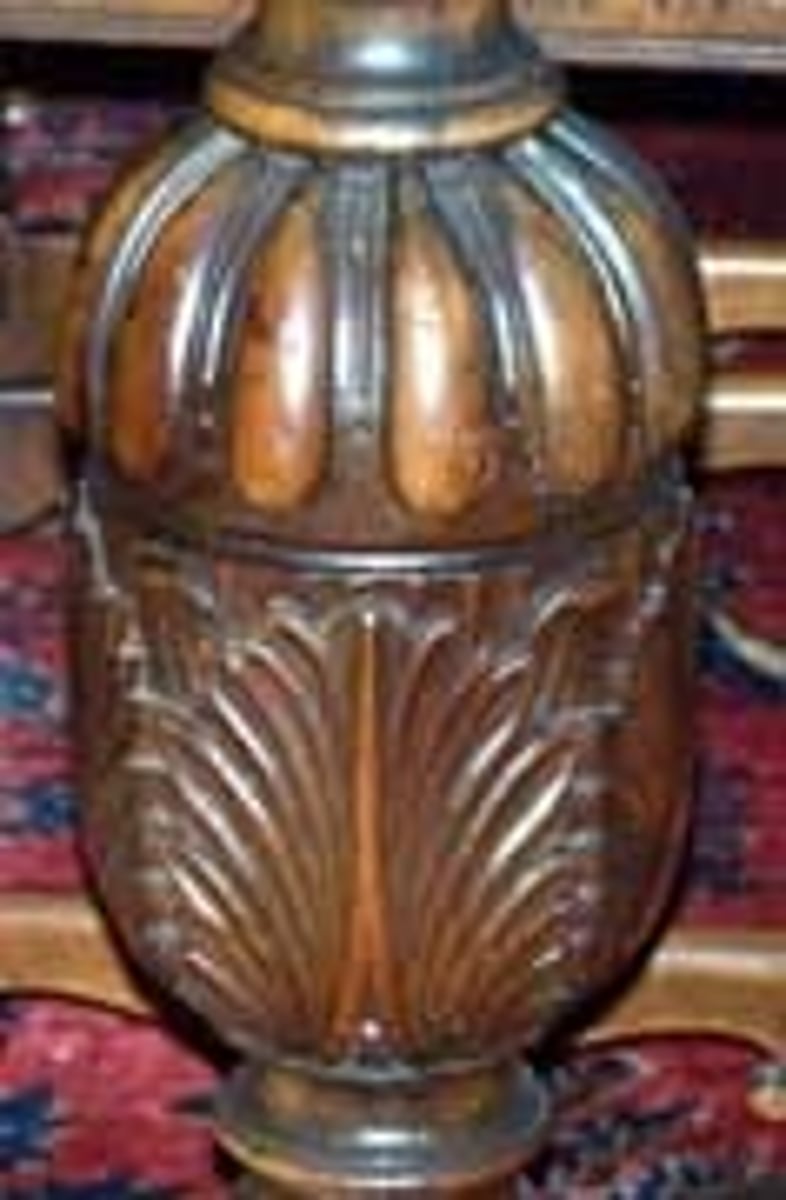
Millefleur
Overall pattern of stylized flowers and plants. French origin.
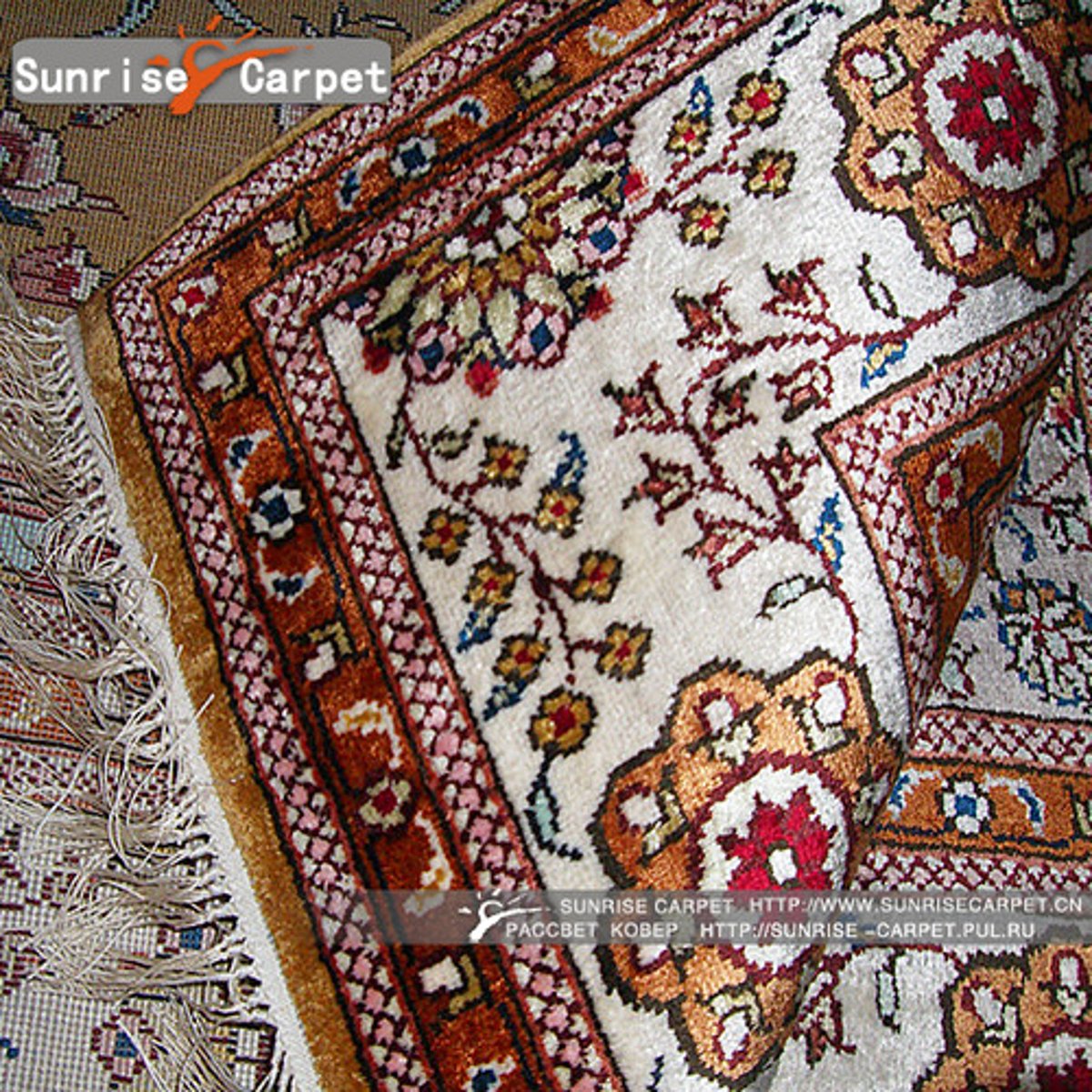
Nosing
The leading or prominent edge of a moulding or drop. It may be the edge of a step or the edge of a table or bench. E.g. a bull.
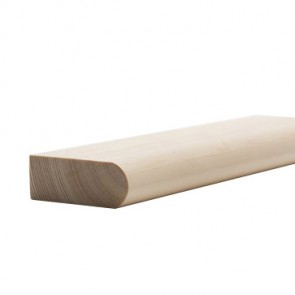
Ogee or Ogive
A molding or an arch from composed of two opposing cyma curves whose convex sides meet in a point, thus forming an s, but is somewhat elongated compared to a cyma.
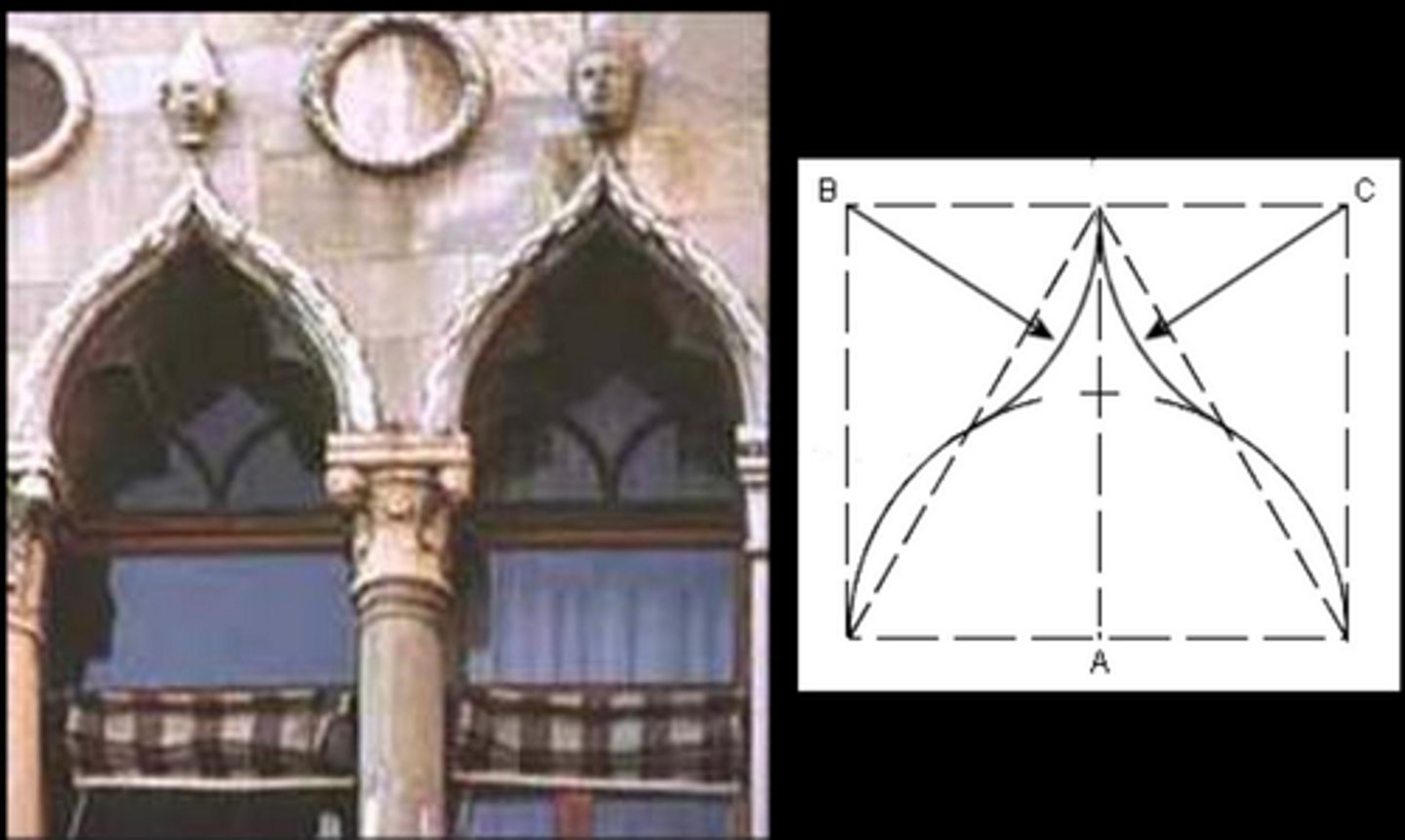
Ormolu
A variety of brass made to imitate golf or bronze.
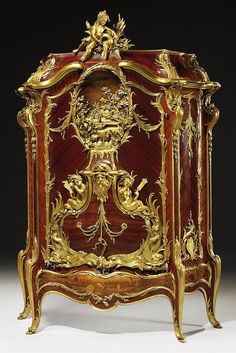
Ormolu Mount
When ormolu is mounted on a surface.
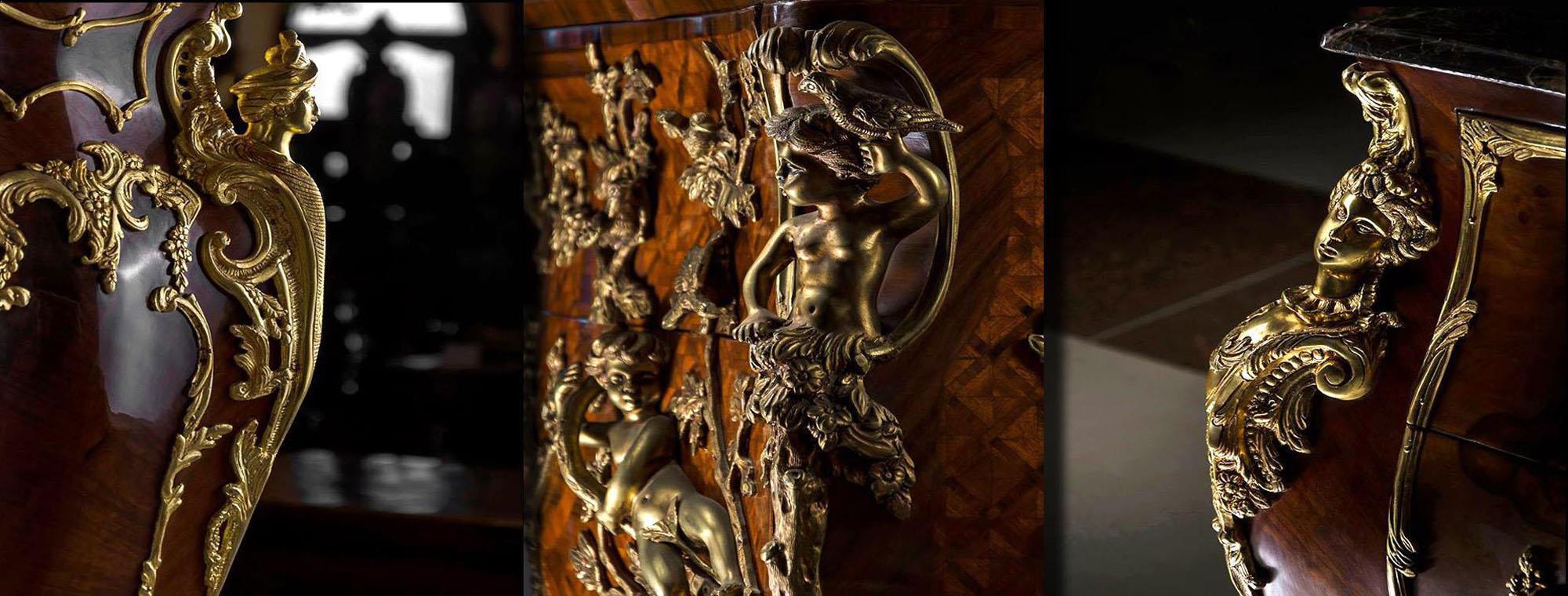
Oystering
Using veneers cut as cross sections of roots and branches of walnut, olive-wood, and some Grecian it is flatter and quirked on top.
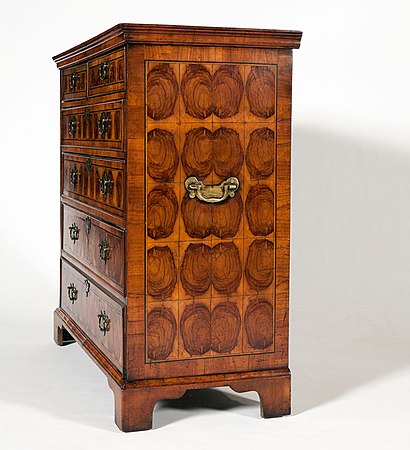
Ovolo
A convex moulding used in classical architecture. It is usually an exact quarter of circle but in Grecian it is flatter and quirked on top.
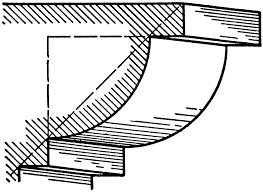
Palmette
a stylized palm leaf shape used as a decorative element in classical art and architecture. Term used in Egyptian Period, same as Anthemion.
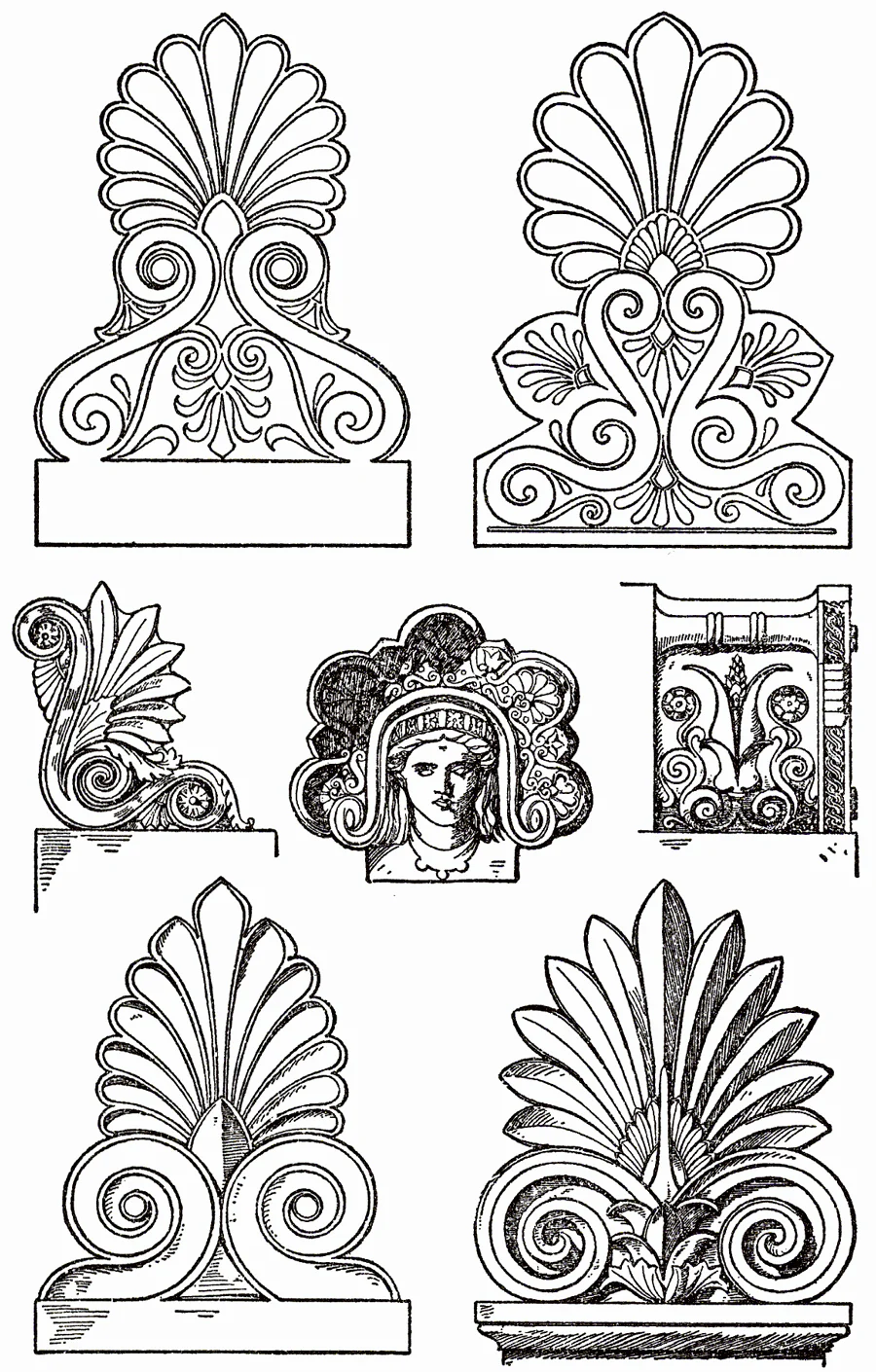
Patera
A flat circle or oval containing acanthus leaves in a rosette arrangement. A round or oval-shaped disk, often enriched by a rosette or other ornaments.
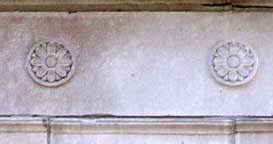
Pendant
A boss elongated so that it hangs down from the intersection of coffers in ceilings or from tables.
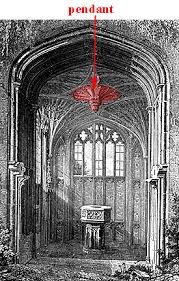
Paper-Mache
A compound of paper pulp or shreds of paper mixed paste or glue to be moulded into various shapes.
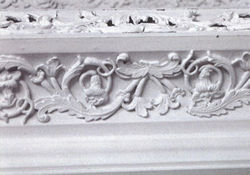
Picture Mold
A horizontal molding near a ceiling from which pictures can be suspended. Also called a picture rail.
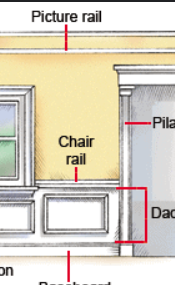
Plate Rail
A rail or narrow shelf fixed along a wall and grooved to hold plates, especially for ornaments or display.
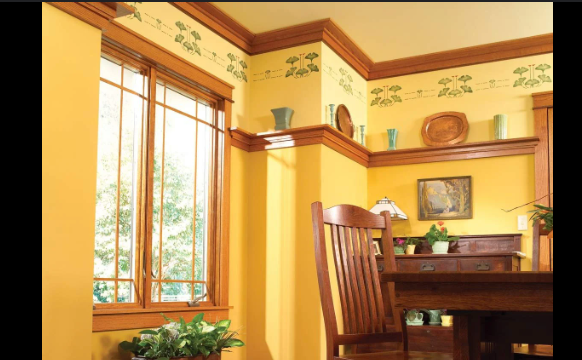
Quatrefoil
A four lobed ornamentation.

Reeding
A long, semi-cylindrical, stem-like or a grouping of such as to enrich moldings. Opposite of fluting.
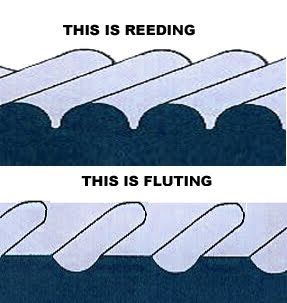
Rinceau
Scroll and leaf ornament sometimes combined with cartouches or grotesque forms and applied to friezes, panels or other architectural forms. It is usually a symmetrical horizontal composition. Sometimes called an 'arabesque'.
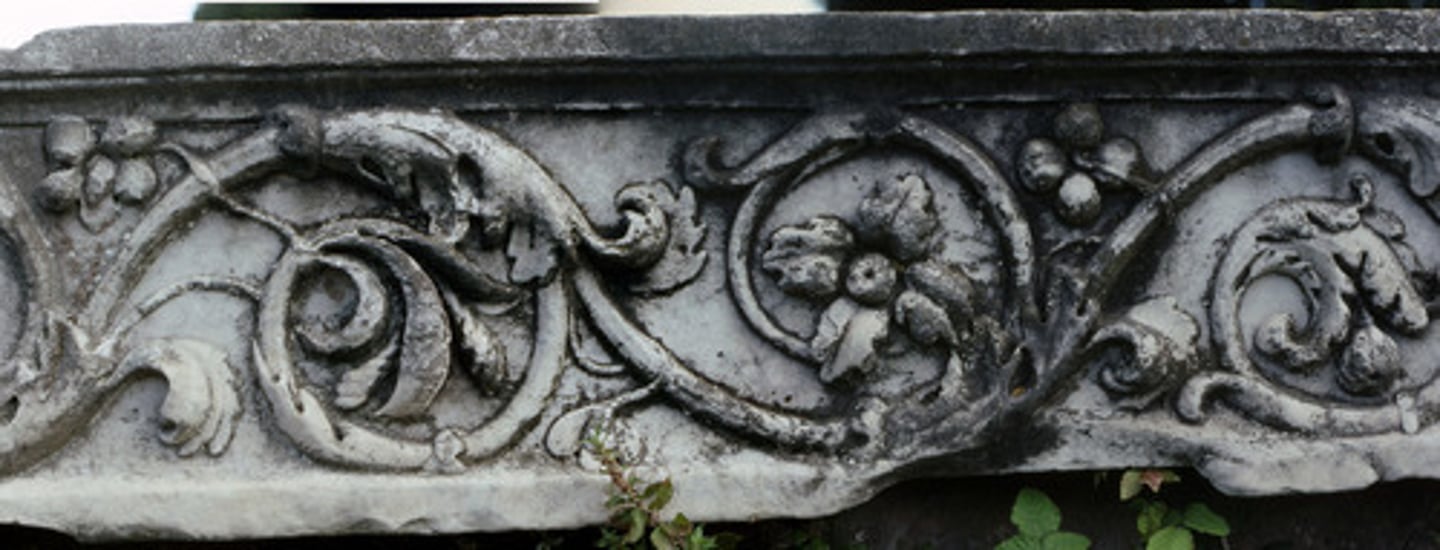
Rosette
An ornamental motif formed by a series of leaves arranged around a central point. The leaves are usually conventionalized and may be arranged to form a circle, ellipse or square.
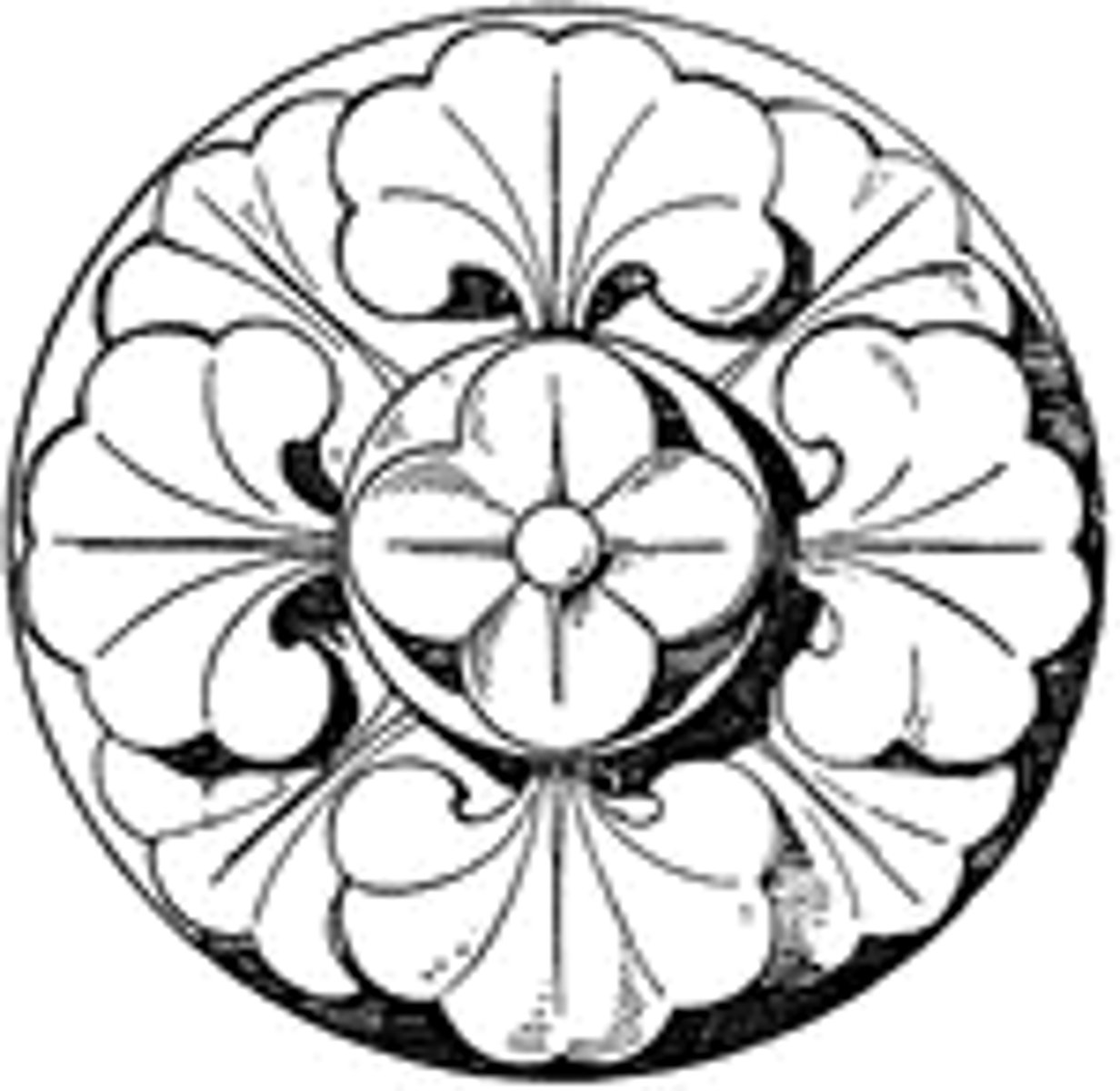
Saltier
An X pattern.
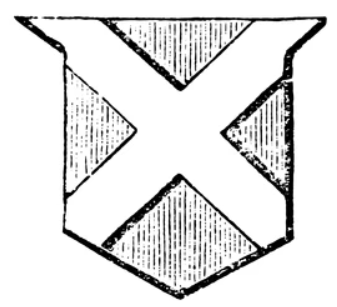
Scallop Shell
A semi-circular shell with ridges radiating froms point at the bottom. This motif was especially common in furniture design during the Queen Anne and Georgian periods in England and the United States. It was also extensively used in the early Spanish Renaissance.
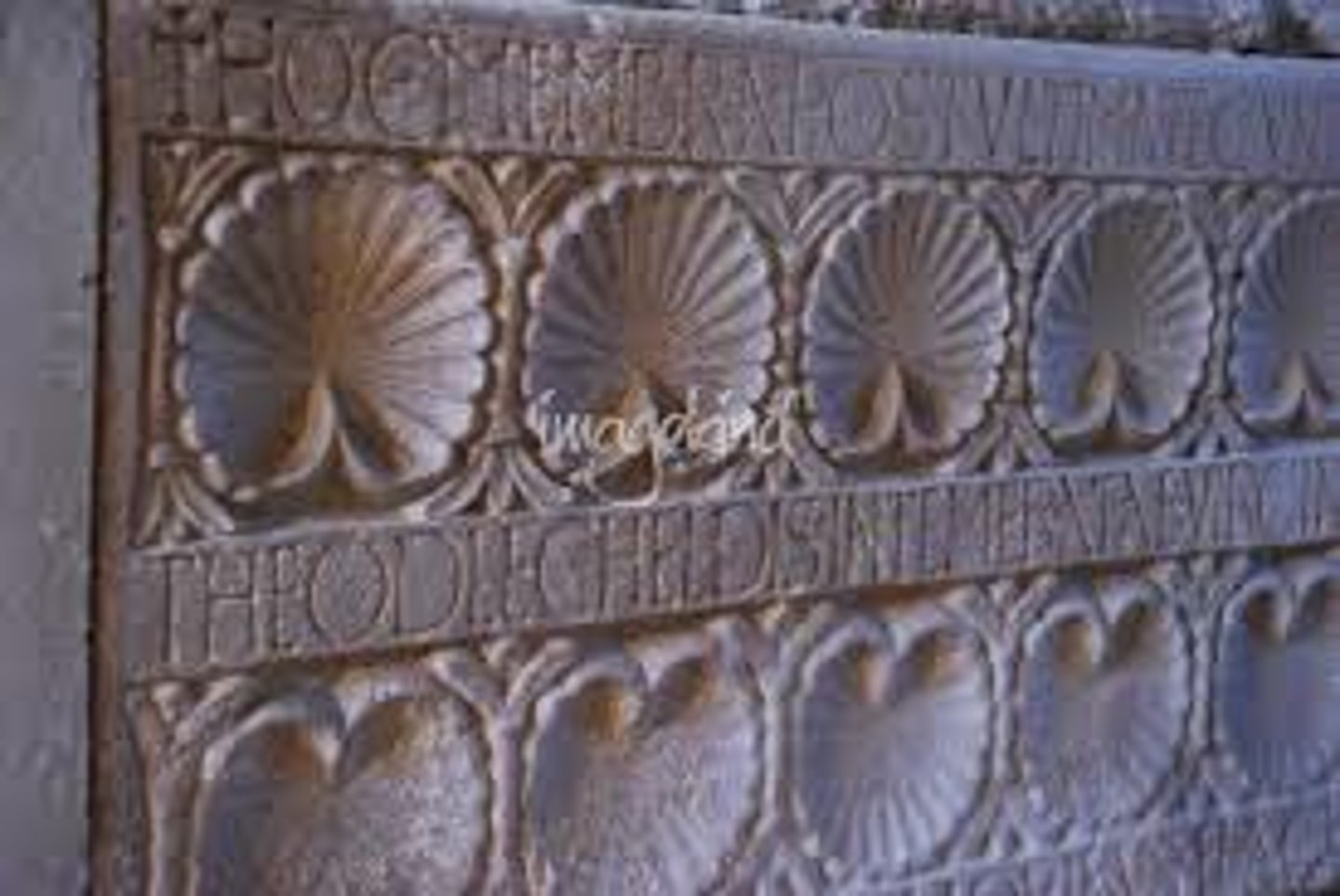
Scroll
A parchment roll used as an ornament.
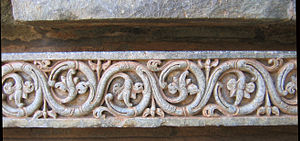
Seaweed
Used as marquetry in furniture panels. Also knows as and 'endive'.
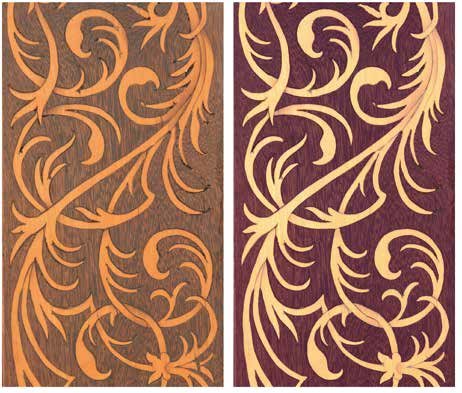
Sphinx
A figure having the head and breasts of a woman, the wings of an eagle, and the body of a lion.
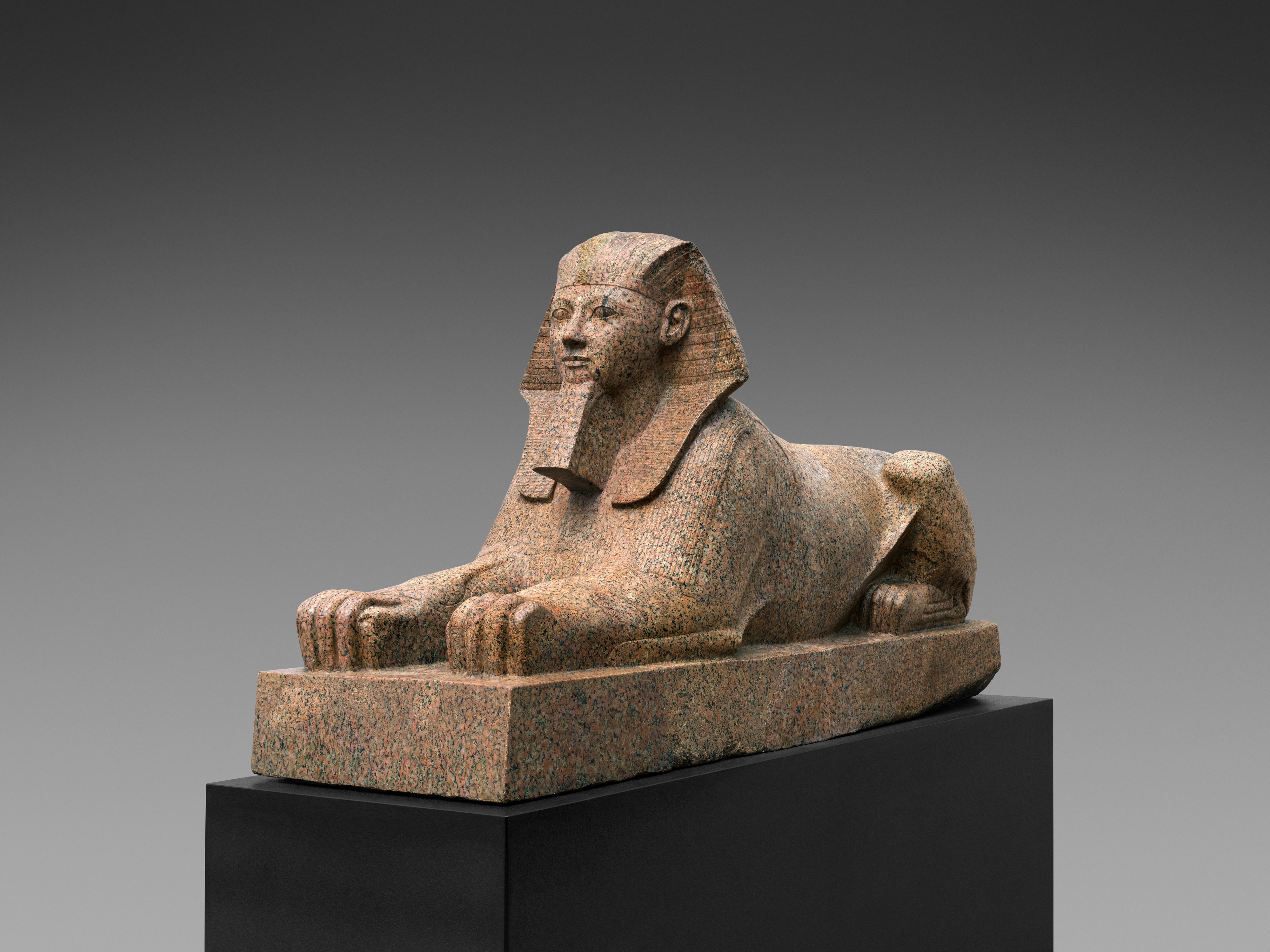
Strapwork
Consisting of enriched interlacing flat bands and forms similar to fretwork.
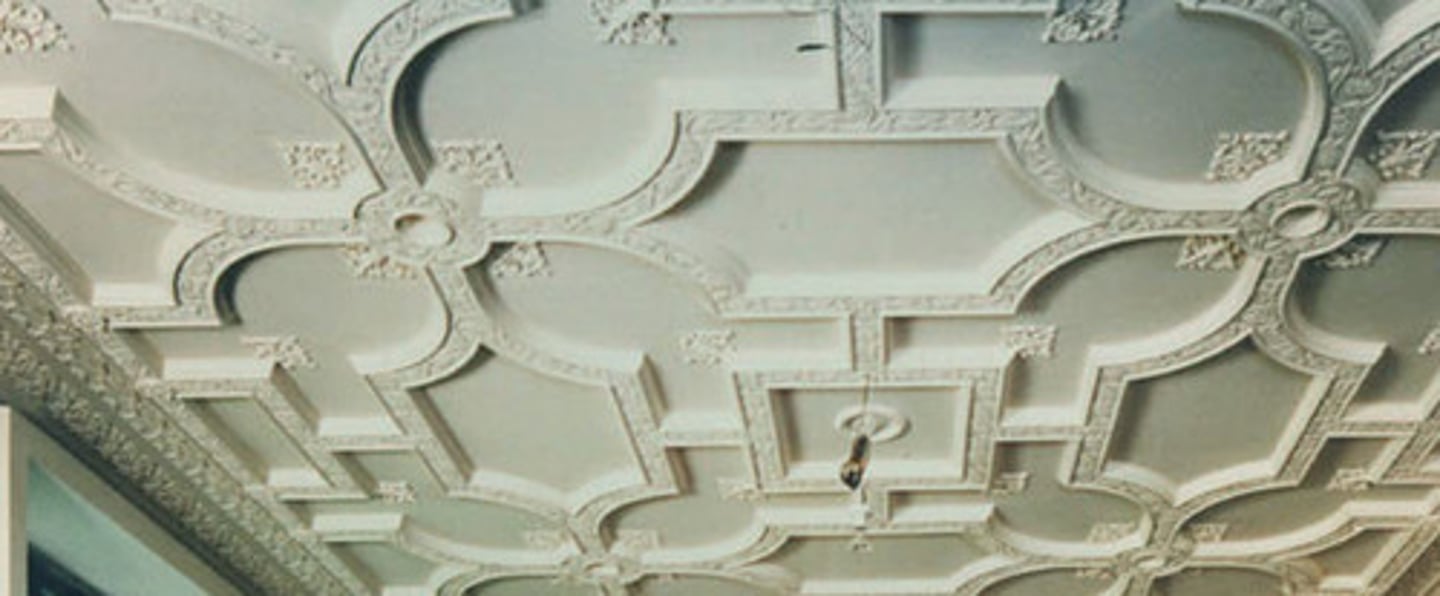
Fretwork
An interlaced decorative design that is either carved in low relief on a solid background, or cut out with a fretsaw, coping saw, jigsaw or scroll saw. Most fretwork patterns are geometric in design. The materials most commonly used are wood and metal.
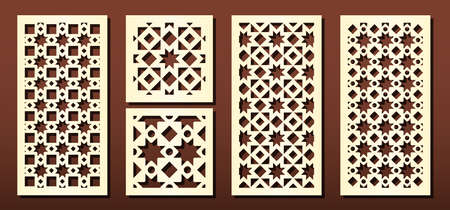
Tracery
The stonework formed in the head of a Gothic window. Applied to the surface on a door or wood panel.
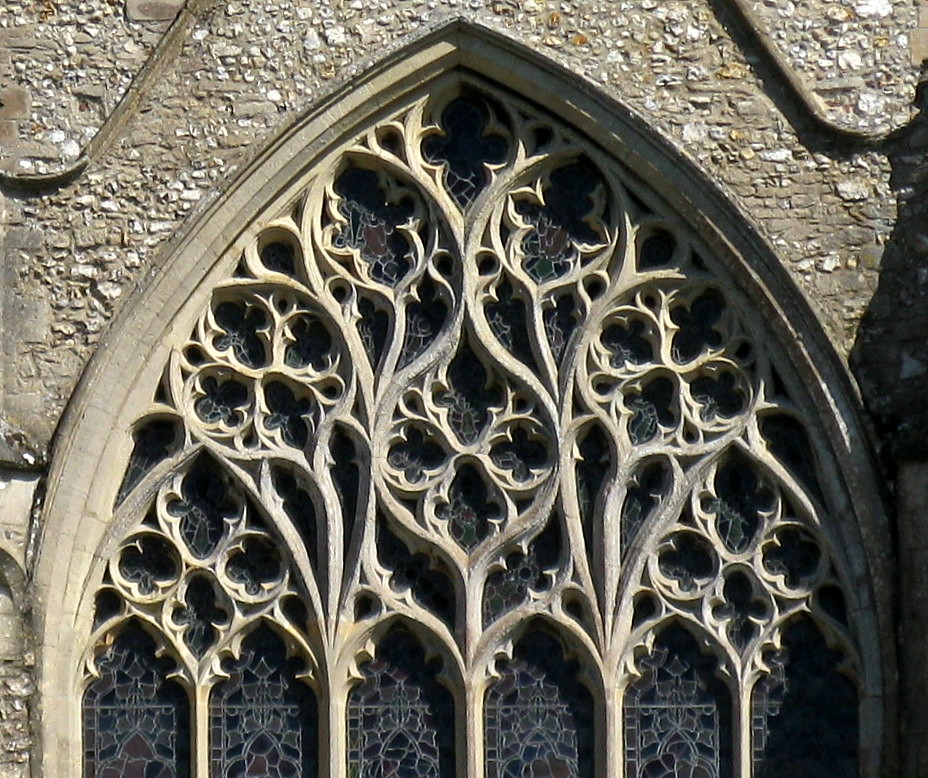
Tree-of-Life Pattern
A pattern resembling a tree or vine, showing branches, leaves, flower, and small animals. Originating in ancient Assyria, it was borrowed by the Persians, East Indians and early English Renaissance designers.
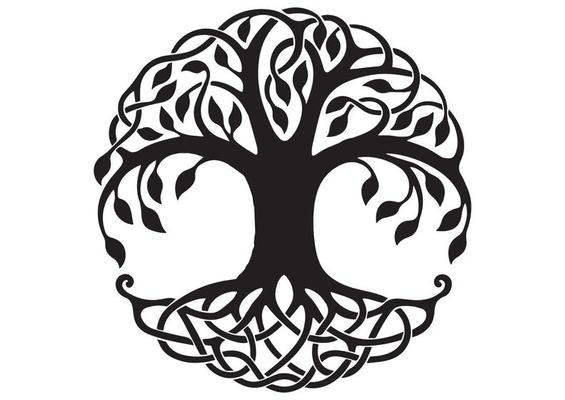
Trefoil
A three-lobed ornamentation resembling a clover.
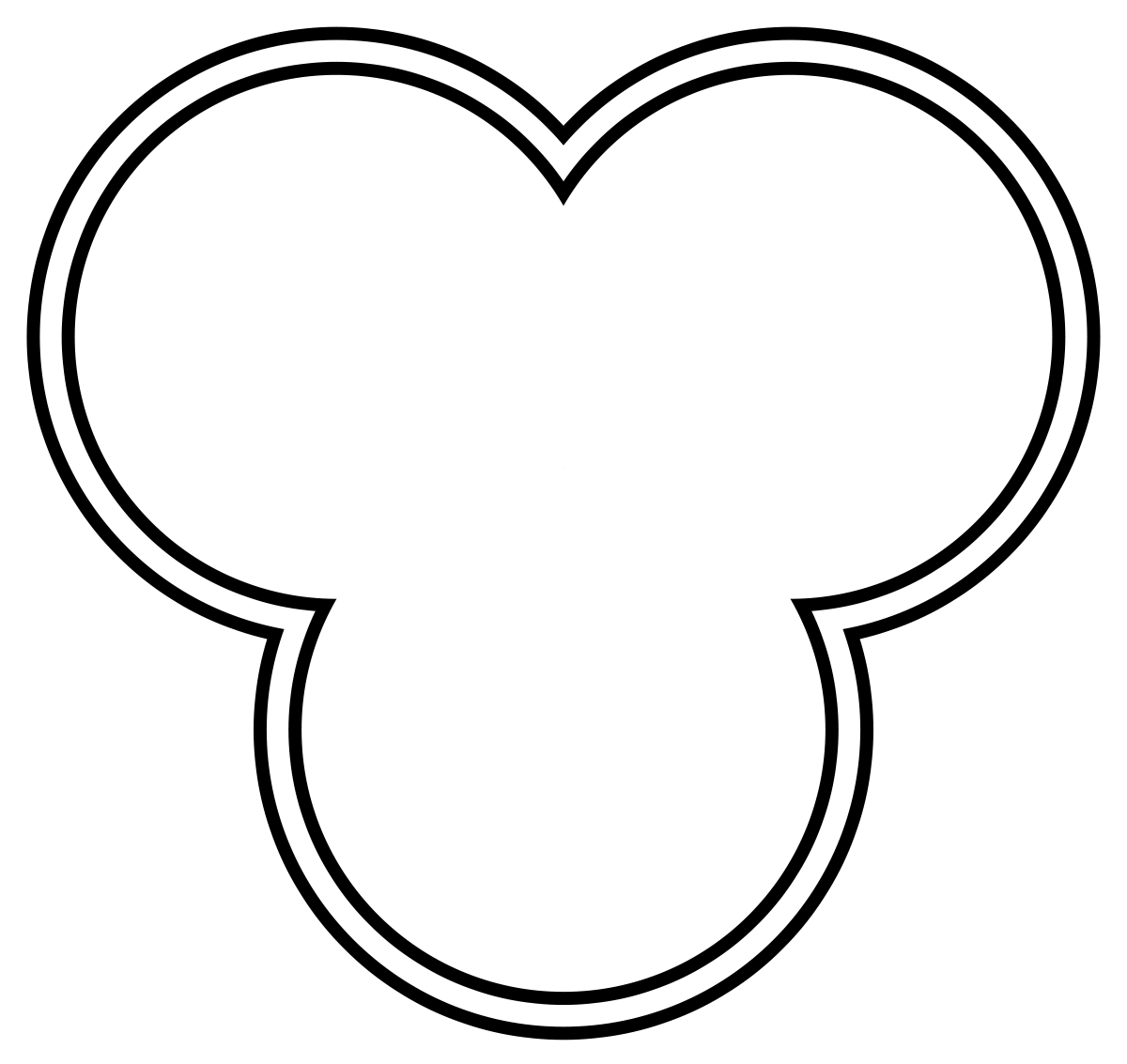
Trim
Millwork around openings such as windows and doors, usually called casings.
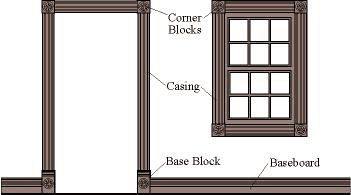
Torus
A convex semi-circular molding.
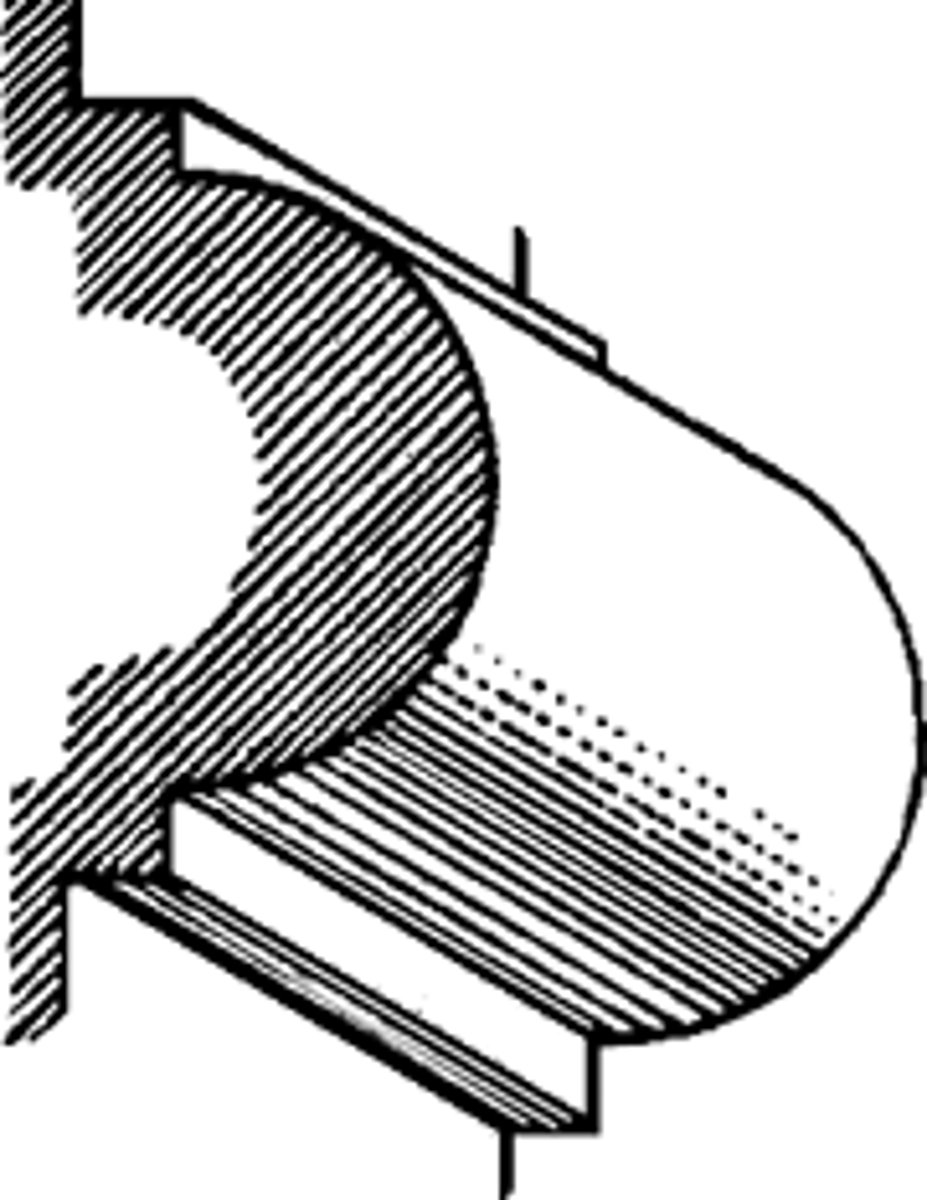
Vignette
Ornamental motifs, patterns or portraits centred on a large field.
Vitruvian Scroll
A peculiar pattern of scroll work consisting of convolved undulations. Imitates a series of breaking wave crests. Also known as Wave Pattern
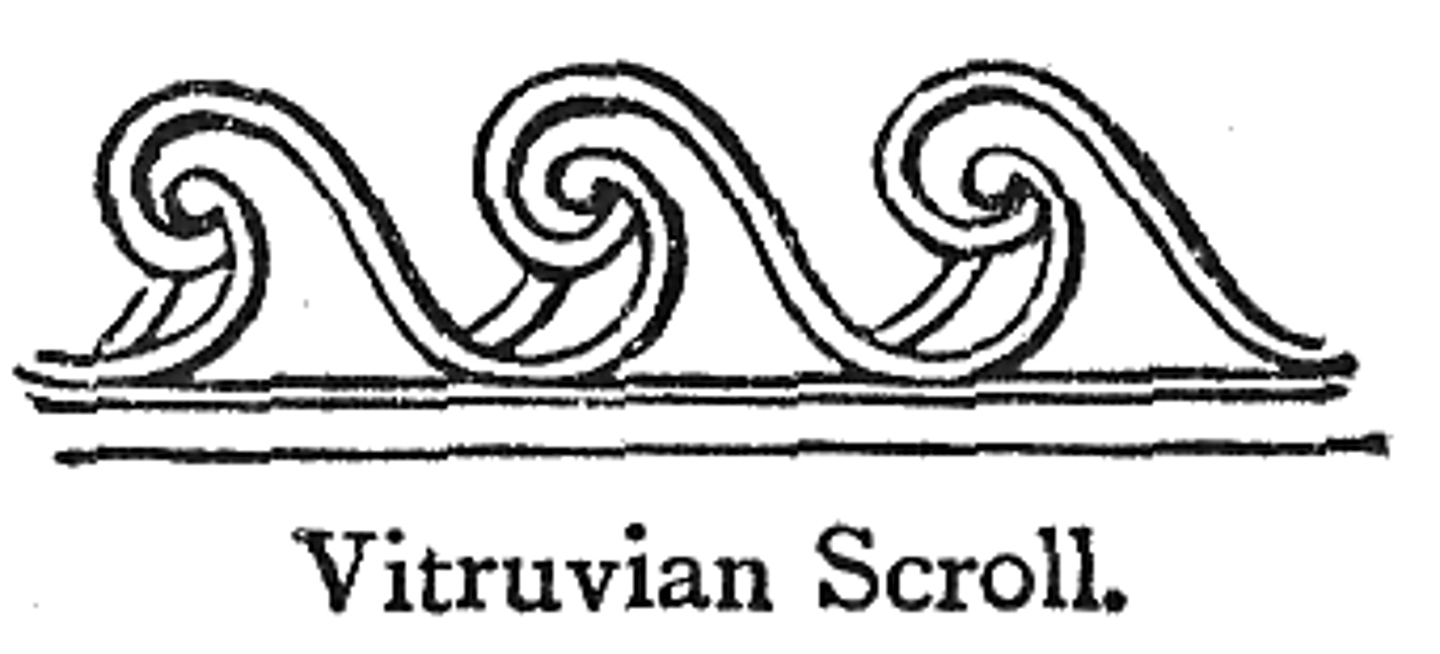
Volute
A spiral scroll forming the principal characteristics of the ionic capital.
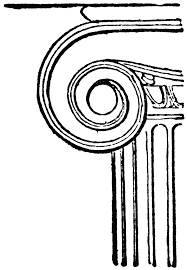
Wainscot
A wooden lining for interior walls, usually paneled. Any treatment resembling the same.
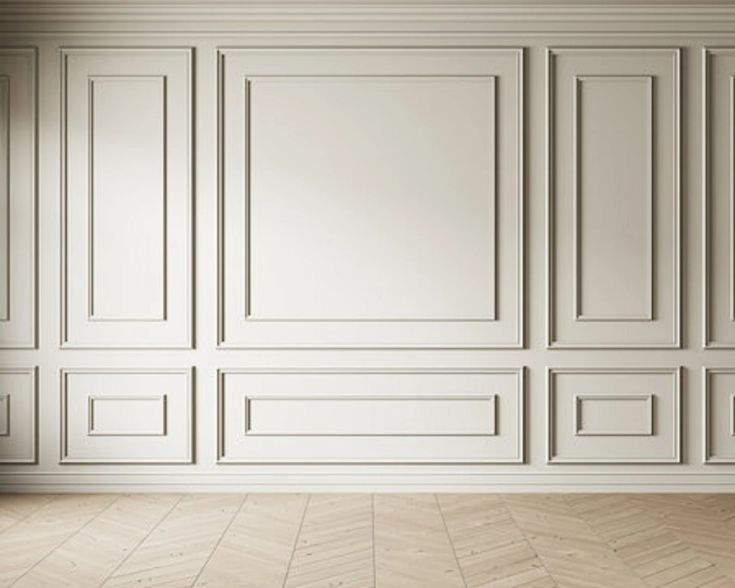
Waterleaf
A conventionalized leaf pattern of classical origin used to enrich a cyma reversa molding. Sometimes called a Leaf and Dart pattern.

Wreath
A decorative band ore garland of flowers, foliage, or other ornamental material.
